



Happy, But You Don’t Know It ink your best days are behind you? Well, think again PAGE 56 “It Depends What Works For You” e complicated history of diets and losing weight PAGE 38 Best of British: Bookshops PAGE 68 Word Power .........................................133 100-Word-Story Competition .............64 If Ruled the World ................................76 Books that Changed my Life ................129 JANUARY 2016 £3.79 readersdigest.co.uk “I Remember”: Ranulph Fiennes PAGE 28 Inside China’s Cram Schools PAGE 98











features
12 IT’S A MANN’S WORLD
Olly Mann contemplates his impending fatherhood
e ntertainment
22 The TRA pp IN g S
O f YOUT h
Legendary actor Harvey Keitel chats about his quirky new film
28 “I R e M e MB e R”:
S IR RANUL ph f I e NN e S
The veteran explorer on family, challenges and why he wants to beat the Norwegians
Health
38 T he e VOLUTION
O f DI e TS
Why we’ve always struggled to eat for our health—and what we can finally do about Inspire
56 WhY YOU’Re (pROBABLY )
h A pp I e R NOW
New research reveals how we can cultivate contentment
64 100- WORD -STORY c OM pe TITION
Send us your tiny tale and be in the running for £2,000!

68 B e ST O f BRITIS h : BOOKS h O p S
It’s easy to lose a whole afternoon in these literary treasure troves
78 f I e LD O f DR e AMS
The story of the football team that’s survived against all the odds travel & a dventure
86 ADVe NTURe S IN QUeeNSLAND
Turtles, beaches and seafood—there’s plenty to enjoy Down Under!
98 ALL OR NOThINg
With so much at stake, students feel the pressure at China’s “cram schools”
Cover Illustrat I on By D av ID H u MPH r I es 01•2016 | 1
2016
Contents JANUARY
p28

IT’S ALL ch AN ge AT Reade R’s d igest.
Firstly, this month sees the launch of a new lifestyle column by our technology writer Olly Mann. When Olly first told me that he and his partner were expecting their first child, I knew this would be the perfect subject for his opening column. Read Olly’s apprehensive but excited musings on p12.
Secondly, the twin concerns of the New Year—losing weight after too much seasonal indulgence and overcoming the winter blues—are tackled in our features on the history of diets on p38 and the importance of happiness on p56. Very weighty issues, but you might be surprised by our conclusions.
Finally, don’t miss our interviews with two legends: Harvey Keitel talks about his new film Youth (somewhat reluctantly) on p22; while Sir Ranulph Fiennes looks back on a lifetime of exploration on p28.
All in all, 2016 is shaping up to be a great year for our little magazine!
 tom Browne
tom Browne
theeditor@readersdigest.co.uk
facebook.com/readersdigestuk
twitter.com/readersdigestuk
pinterest.com/rdigestuk
google.com/+readersDigestuK1
| 01•2016 2 IN e V er Y I ssue 6 over to you 8 s ee the World Differently e ntertainment 17 January’s cultural highlights Health 46 advice: s usannah Hickling 52 Column: Dr Max Pemberton Inspire 76 If I ruled the World: alastair Fothergill travel & a dventure 94 Column: Catherine Cole Money 106 Column: a ndy Webb food & Drink 112 tasty recipes and ideas from rachel Walker Home & Garden 116 Column: lynda Clark technology 118 o lly Mann’s gadgets f ashion & Beauty 120 Georgina yates on how to look your best Books 124 January Fiction: James Walton’s recommended reads 129 Books that Changed My life: rosemary Conley f un & Games 130 you Couldn’t Make It u p 133 Word Power 136 Brain teasers 140 l augh! 143 Beat the Cartoonist 144 60-s econd stand- u p: tiff stevenson e DI tor’s letter
Reader’s Digest is published in 31 editions in 15 languages




































edItOr-IN-ChIef Tom Browne
aSSIStaNt edItOr Fiona Hicks
dIGItaL edItOr Mandi Goodier
aSSIStaNt dIGItaL edItOr Anna Walker
art dIreCtOr Yvey Bailey
GraPhIC deSIGNer Katie Johnson
advertISING dIreCtOr Simon Fulton simon.fulton@readersdigest.co.uk 0203 701 5936
advertISING aCCOUNt dIreCtOr Mike Allen mike.allen@readersdigest.co.uk 0203 701 5935
CeO Gary Hopkins
ChIef OPeratING OffICer Julie Leach
dIGItaL MarKetING aNd CaMPaIGNS
MaNaGer Maggie Champion
trUSted MedIa BraNdS INC (USa) President and Chief executive Officer
Bonnie Kintzer
vice President, Chief Operating Officer, International Brian Kennedy editor-in-Chief, International Magazines
Raimo Moysa
For all subscriber enquiries, please use the customer services number below
We Pay...
£50 for the star letter and £30 for regular letters.
Email readersletters@readers digest.co.uk or go to readers digest.co.uk/contact-us
We a LSO Pay...
£50 for the true stories, anecdotes, jokes in Laugh! and you Couldn’t Make It Up…, and contributions to end-ofarticle fillers and My Great escape.
Email excerpts@readersdigest.co.uk or go to readersdigest.co.uk/contact-us
S O rry!
We cannot acknowledge or return unpublished items or unsolicited article-length manuscripts. Do not send SAEs. Article-length stories, poetry and cartoons are not requested.
C US t OM er Serv IC e S
Contact Customer Services for renewals, gifts, address changes, payments, account information and all other enquiries. Call 0330 333 2220* or email customer_service@readersdigest.co.uk
taLKING MaGaZINeS
Reader’s Digest is also available in audio and accessible etext editions from RNIB Newsagent, for blind and partially sighted readers. Call the RNIB Helpline on 0303 123 9999 or visit rnib.org.uk/newsagent
SUBSC r IP t ION S
Visit readersdigest.co.uk or write to: Reader’s Digest, PO Box 7853, Ringwood BH24 9FH. UK: £45.48 a year. republic of Ireland: €61.20 a year. Prices include delivery. For gift subscriptions, contact Customer Services.
| 01•2016 4 *Calls to 03 numbers cost no more than a national rate call to an 01 or 02 number and will be free if you have inclusive minutes from any type of line including mobile, BT or other fixed line
us your stories, jokes and letters or Visit o ur Website
Include your name, email, address
We may edit letters and use them in all print and
world copyright of Vivat Direct Ltd (t/a Reader’s Digest).
Write to us! send
small Print: Ensure submissions are not previously published.
and daytime phone number with all correspondence.
electronic media. Contributions used become
paper from sustainable forests. please recycle © 2015 Vivat Direct ltd (t/a reader’s Digest). british reader’s Digest is published by Vivat Direct ltd, 57 margaret street, london W1W 8sJ. all rights reserved throughout the world. reproduction in any manner, in whole or part, in english or other languages, is prohibited. reader’s Digest is a trademark owned and under license from trusted media brands, inc, and is registered with the united states patent and trademark office. all rights reserved. classified advertising by madison bell. printed by polestar chantry, polestar uK print ltd. newstrade distribution by seymour Distribution limited.
readersdigest.co.uk

Ringing the changes!
It’s all fresh starts over at Reader’s Digest online as we welcome in the New Year. This month, we’re offering advice on how to make resolutions you’ll actually stick to, as well as seeking out the world’s best secret skiing and ice-skating locations. Plus, we’re fighting the January frost with our favourite melted-cheese recipes—serious soul food.
Listen up…
2016 marks the first full year of Reader’s Digest podcasts. Join us as we chat to Professor Rudi Westendorp about how to grow older without feeling old, while editor Tom Browne talks to Ann Morgan about her debut novel Beside
Myself. You can catch up on all our podcasts by subscribing via iTunes, or visit readers digest.co.uk/podcast




Does your resolution involve DIY? These disasters, as seen on Reddit, might make you think twice




5 01•2016 |
quick Fixes
FOR MORE, GO TO readerSdIGeSt.CO.UK
See more at readers digest.co.uk/inspire twitter.com/readersdigestuk facebook.com/readersdigestuk pinterest.com/rdigestuk google.com/+readersDigestuK1
Over to You
We pay £50 for Letter of the Month and £30 for all others
✯ letter of the month...
I was happy to read “Best of British: Bridges”. In 1940, my dad was a temporary taxman. After Somerset House was bombed, HMG thought it wise for the nation’s tax-gatherers to be moved out of range of the Luftwaffe, so we were bundled off to North Wales.

There I became enamoured with Telford’s Conwy (as it was then named) Suspension Bridge. It had a walkway attached where we boys used to stand and watch the cormorants diving in the river currents and place small wagers on where they would surface. The bridge used to shake every time a bus went over, so we would jump about to see if we could shake it again.
Even at the age of six, we could appreciate its beauty and dramatic effect as it aimed its traffic directly at the walls of King Edward’s castle. It still features in my hiraeth of that place—I didn’t realise at the time how lucky I was that chance had brought me there.
I n SPI re D BY the BA r D
I enjoyed “I Remember” with Wilko Johnson. He’s a great character, and I could identify with him about discovering Shakespeare.
When I read my first Shakespeare play (Taming of the Shrew), I was
DAVID POWIS, Dorset
immediately hooked. His plays express aspects of life that transcend time. Love, revenge, war and political intrigue are just a few themes that are applicable to any age. They’re the reason I’m now an English teacher!
ANNABEL HAMMETT, Cheshire
6 | 01•2016
LETTE r S o N THE N oVEMBE r ISS u E
B r AI n tr AI n I n G
“The Beautiful Life Of Your Brain” was a superb article, and I felt a lot more knowledgeable after reading it. Of course every animal you can think of—mammals, birds, reptiles, fish, amphibians—has a brain, but the human brain is unique. And it performs an incredible number of tasks,every one of them vital to our existence.
Thank you for all the suggestions, which included mindfulness and meditation. In the future, I intend to make my brain work faster, smarter and better than ever.
KIRA AITKINS, Wirral
W orth the me SS
I was fascinated to read about John Torode in “If I Ruled the World” and I agreed with a lot of what he said, especially about more street vendors selling food. I see quite a few street-food stalls in London and I wish they were more popular in other parts of the country. Kerbside grub can be absolutely delicious and mouthwatering.
In fact, I believe that if only more people set up in business, they’d realise customers think their dishes are well worth the messy fingers.
ABBY HARDEN, Carlisle
A ltrUISt IC A n I m A l S
I was delighted by the stories in “Tails of the Unexpected” about animals that have been lifesavers. These animals truly were heroes. Not people in uniform or those in the profession of saving lives—not human at all, in fact—just animals who wanted to help.
I remember being abroad many years ago when a teenage boy got into difficulty in the sea. He was nudged into shallower waters by a dolphin. His parents didn’t believe him, but he was adamant the dolphin had tried to help him. Your article proves there are many people out there who owe their lives to the protection and brave acts of animals.
JENNA BURTON, Clywd
tr IA l S of teenAG er S
I have two teenagers in the house, so I read “How To Have A Brilliant Teenager” with interest.
Adolescence is a stage in our children’s lives that the majority of us dread. Competent people who have enjoyed parenting until then suddenly become unhinged during their children’s teenage years. I’m one of them—so any tips that could make life easier are fully appreciated!
RYAN GEORGE, Wrexham
7 01•2016 |
WE WANT TO HEAR FROM YOU! Send letters to readersletters@readersdigest.co.uk Please include your full name, address, email and daytime phone number. We may edit letters and use them in all print and electronic media.

8 PHOTO BY SIMON BECK

THE WORLD
the page
SEE
Turn
 PHOTO BY SARAH QUANTOCK
PHOTO BY SARAH QUANTOCK

...DIFFERENTLY
Snow artist Simon Beck has been beautifying the Alps for a decade —using just his snowshoes! The 56-year-old map maker and Oxford graduate creates these intricate designs by walking across freshly fallen snow. But it’s not all fun and games. Each image takes around 11 hours to complete, along with painstaking mathematical calculations (he keeps a compass handy). Beck walks about 25 miles when making a really large drawing—this one is spread 165 yards wide over the Lake Marlou at the French Arcs 2000 ski resort.
11
In the first of a new column, Olly Mann gets to grips with the delight—and fear—of impending fatherhood
Life Will Never Be The Same Again…

Olly Mann is a writer, LBC presenter and serial podcaster, with shows including Answer Me This!, The Media Podcast and The Modern Mann
I’m havI ng a baby. except, I’m not: I don’t have a womb.
I know my world is about to change forever. I know it’s going to cost me a packet. I know it’ll be approximately a decade before I sleep for eight hours straight. But I haven’t —as my partner has—played out the past seven months with a cluster of cells growing inside me, conspiring to create life; kicking, squirming, anxious to arrive. I haven’t had morning sickness. I haven’t taken even a single vitamin. I’ve yet to experience things that force me to think of myself as a parent.
Not that I’m complaining. I’m a feminist and all that, but if biology dictated that expectant dads had to endure even half the physical burden during pregnancy, I’d be straight on the internet looking for a surrogate. It’s just that I’d prefer to be a little more prepared. When I share our happy news with friends who are already fathers, they fix my gaze, shake their heads dismissively and say, “You have no idea what’s about to happen to you.”
I t’s true. I have l I ttle concept of the realities of sleepless nights and puking and nappy rash and interfering relatives and mystery illnesses. But that doesn’t mean I don’t have questions.
For example, what the hell am I supposed to do during
| 01•2016 12
It’s a Mann’s World

the birth? Being a 21st-century chap, I’m planning to be present for its duration. This is as much motivated by selfishness as by altruism: I’ve yet to meet a dad who doesn’t tell me what a magical moment it is
when you get a first glimpse of your progeny.
But I’ve also, foolishly, watched a lot of One Born Every Minute, and thereby witnessed multiple varieties of man put his own preposterous
Reade R ’s d igest 01•2016 | 13
Illustrat I on by Matthe W h oll I ngs
spin on the role: the over-supportive husband, squeezing his wife’s hand while she repeatedly screams him away; the relaxed Romeo, who appears to consider the whole exercise a confirmation of his own virility; and the eternal optimist, who emanates calm and cheeriness as his wife is wheeled off for an emergency caesarean. No one seems to do it properly.
Secondly, how am I to deduce which of the myriad baby gizmos on sale are worthwhile, and which are a complete waste of time? I mean, instinctively I know that a breast pump is probably useful and a dalekshaped baby-wipe dispenser probably isn’t. But what about the stuff in between? In the stores, all the essential your-childwill-die-without-this stuff is displayed cheek by jowl with the expensive, superfluous tchotchkes.
monitor that syncs up with Spotify, or a nappy that posts a Facebook update when it reaches saturation. The iNappy, perhaps.
th I rdly, and most press I ngly: my child is to be a boy. How do I ensure he develops zero interest in football? I already dread the day he summons me for a kickabout in the garden. (I still, aged 34, have no idea of the rules and no intention of learning.)
In an ideal world, I’d like access to some sort of man’s midwife, with whom I could discuss my neuroses
While he’s still very young, I can—with a little luck—fake enough enthusiasm to persuade him I’m Like Other Dads. Convincing a four year old that I’m the best player since Pelé probably doesn’t require exceptional ball-handling skills. But what if he starts playing for the school team? How am I to camouflage my lack of knowledge from other dads?
Mind you, it’s not the expense that primarily concerns me: as Reader’s Digest technology columnist, I could ring round my contacts and request samples of baby products for free. But then I’d inevitably end up introducing entirely unnecessary innovations into the nursery: a baby
If only there was some way, right from the outset, of indoctrinating my boy to appreciate country walks and musicals instead…but I know from my own experience that there isn’t. Dad was so keen for me to take an interest in his classic-car business that I slept in a classic-car-shaped bed, the walls of my nursery were
It’s a Mann’s World | 01•2016 14
bedecked in classic-car print, and I even had my own dinky classic car to wheel around the living room. As soon as I was able to verbalise an interest, I wanted to work in radio.
these concerns, I real I se, are small fry indeed compared to, “How will I endure the pain of labour?”, “Will my figure ever return to its prepregnancy shape?” and, “If I don’t bond with him, can I send him back up there?” I understand completely
why all the health support seems to revolve around the mother.
However, in an ideal world, I’d like access to some sort of man’s midwife, with whom I could discuss my neuroses before finding myself plunged into proper parenthood. I only suppose that, once the day finally comes and my son has arrived, these matters will simply seem irrelevant.
After all, I have no idea what’s about to happen to me.
THE TRIALS OF LOVE
here’s a real, unedited text conversation between two nine-year-olds:
Girl: So r we together
boy: I don’t know do you want to do be together
Girl: Only if u want to boy: I don’t care it’s your choice
Girl: But I wanna know do you like me that you’ll be my bf....???
boy: yes
Girl: So r we together and I don’t want u saying idc [I don’t care] bc then Imm a think u don’t want to
boy: ok
Girl: So we r??
boy: yes because you want to and I do to
Girl: Do u love me??..??????
boy: yes
Girl: Fr [for real]
boy: yup
Girl: So wyd
boy: because
Girl: It means what are you doing
boy: I’m just in my room texting you
Girl: Oh ok
SOURCE: THEPOKE.CO.UK
Reade R ’s d igest
01•2016 | 15















Films
by tom browne
Movie of the Month
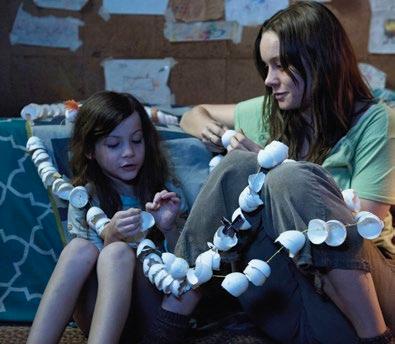
In close proximity: Jack (Jacob Tremblay) and Joy (Brie Larson)
■ drama: room Five-year-old Jack (Jacob Tremblay) and his mother Joy (Brie Larson) are held captive in a tiny room by a man referred to as Old Nick (Sean Bridgers). Although Joy tries to protect her son from the reality of their situation, circumstances eventually force her to enlist Jack’s help in a plan of escape. Author Emma Donoghue has done an fine job of adapting her own 2010 novel, and she’s ably assisted by director Lenny Abrahamson, the man behind 2014’s marvellous Frank. As you’d expect from a story inspired by the notorious Josef Fritzl case, this is intense viewing at the best of times, but the stunning performances by Larson and newcomer Tremblay —along with some fine support—make this an early contender for film of the year.
■ comedy: sleeping with other people Twelve years after a college entanglement, Jake (Jason Sudeikis) and Lainey (Alison Brie) attempt to pursue a platonic relationship in New York, despite a deep-seeded attraction. This is essentially When Harry Met Sally with fruitier dialogue, although the comparison is somewhat flattering. Still, if you’re looking for an undemanding date movie with cheeky laughs, you could do worse.

■ documentary: Bolshoi BaBylon
This fascinating account of the 2013 acid attack on Moscow’s Bolshoi Ballet’s artistic director Sergei Filin explores the dark underbelly of professional ballet, also hinted at in Darren Aronofsky’s Black Swan. But like all good documentaries, it’s the wider issues highlighted by the subject matter —ambition, resentment and politics both inside and outside the theatre walls—that really draw the viewer in. Compelling stuff.

01•2016 | 17 entertainment © STUDIO CANAL / © IFC FILMS / © A LTITUD e F ILM eNT er TAINM e NT
Eddie Redmayne (right) and Alicia Vikander

■ biopic: the danish girl Eddie Redmayne scooped the Best Actor Oscar in 2015 for his epic performance as Stephen Hawking in The Theory of Everything, and he has every chance of repeating the dose with this love story based on the life of transgender woman Lili Elbe. Director Tom Hooper (who also won an Oscar for The King’s Speech) handles the material with sensitivity, and there are solid supporting turns from Alicia Vikander and Ben Whishaw.
■ drama: youth Michael Caine and Harvey Keitel (see interview on p22) play old friends reminiscing about their lives and loves within the confines of a Swiss hotel, populated by some decidedly offbeat guests. The ingredients of this surreal drama are rather disparate—and some clash rather than complement each other— but the final dish is still a tasty and satisfying one.
DVD of the month
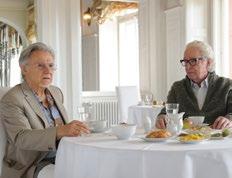
■ 45 years* Charlotte Rampling and Tom Courtney are great as a couple confronted with an issue from the past.
On Your Radar Owen Hollifield, mechanic
Watching: Breaking Bad (box set) Superb writing coupled with a supremely talented cast make this the best show on TV—ever!

Reading: meg by Steve alten I’m revisiting an old favourite. This is a “novel of deep terror” and a rollercoaster ride of a story.
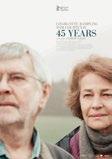
Online: wales online I like to be up to date with what’s happening in the local news.
l istening: Various I’m very old-fashioned when it comes to music—I listen to records, tapes and CDs. I can spend many a happy afternoon inside an old record shop searching for some lost classic.
Fancy appearing in this section? Send your current cultural favourites, along with short descriptions, to readersletters@readersdigest.co.uk
| 01•2016 18 e NT er TAINM e NT
© UNIV er SAL PICTU re S / © G IANNI F IO r ITO
* TO BUY DVDS FEATURED HERE, GO TO SHop.readerSdiGeSt.co.uK
Music
by mandi G oodier Album of the Month
Curve of the earth
by mystery Jets
“We’ve been through quite a lot in the last couple of years,” says guitarist Will Rees. “I think these songs have real feeling about them.”
Rees is quite right about that. This album sounds huge, creating palpable space between the roomy drums, ambient piano and clean, melodic guitar. For a band associated with poppy indie tunes, it’s full of real musical accomplishment, and the title sums up a record that’s overpowering, ethereal and emotive at the same time. And don’t worry: the catchy choruses are still there—they’ve simply got bigger along with their sound.

Key tracks: “Bubblegum”, “Blood Red Balloon”, “The End Up”
Like this? You may also like: The War on Drugs, Grizzly Bear, Pink Floyd
overlooked record from the past the gulag orkestar
by beirut
Released in 2006, this sounds like it’s been plucked straight out of Dostoyevsky’s Russia. But listen closely and you’ll hear lyrics that recall war-torn 1940s Europe and Cold War-era Germany. Pay even more attention and you may pick up the Americanisms of the singer—this, after all, is the project of US citizen Zach Condon, created after two years spent travelling round Europe.

On Our Radar
London Short Film Festival, Jan 8–17
Showcasing cuttingedge UK film makers.
celtic connections, Glasgow, Jan 16–20
Celebrating Celtic music and cultures across the globe.
It’s a style that’s been imitated since, particularly in the twee folk boom that followed its release. But few have the power to transport you in the way The Gulag Orkestar does.
australian open, Jan 18–31 The first tennis Grand Slam of the year.
Reade R ’s d igest 01•2016 | 19
liSTEn TO THESE AlBUmS AT readerSdiGeSt.co.uK/LiSten







How Can Life InsuranceMake You Happier?
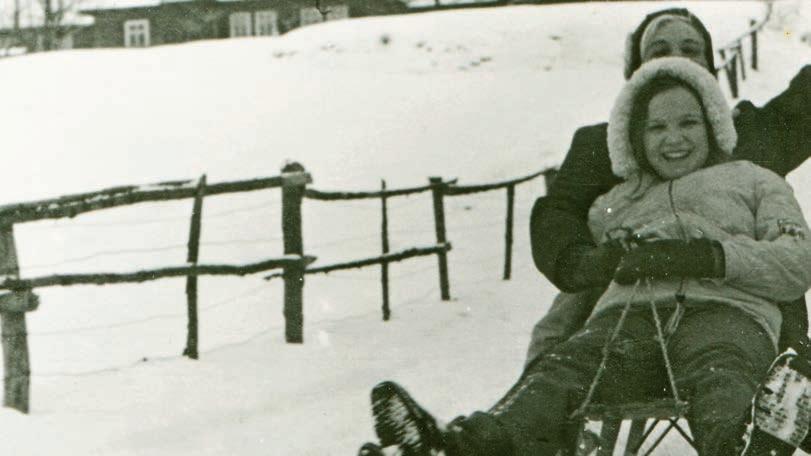
Happiness is about having peace of mind, so Reader’s Digest has partnered with Royal London to provide Over-50s Life Cover
When you’re busy getting on with life, it may seem a little morbid to think about the time when you won’t be around any more. But a little planning now could give you peace of mind and save your family the worry of not having enough money to pay for your funeral. In fact, it could be one of the most important gifts you leave them.
Take a minute to think about whether your family would have enough money to pay for your funeral. One of the ways you can protect your family from the shock of a large funeral bill is by taking out Over 50s Life Cover. is pays out a lump sum when you die, which your loved ones can use to help pay for your funeral or anything else they choose.
PARTNERSHIP PROMOTION
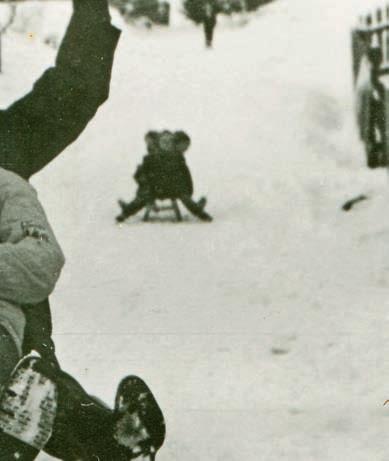
e great things about over-50s policies are that:
❖ They may have low payments;
❖ You won’t have to answer questions about your health or have a medical examination;
❖ They pay out a fixed lump sum on your death so you’ll know exactly how much your loved ones can expect to receive.
As you might expect, not all over-50s policies are the same, so it’s a good idea to shop around. A big worry with over-50s policies can be that you won’t get anything back if your circumstances change and you can’t a ord to keep paying your premiums. Royal London understands this, so it’s introduced Over 50s Life Cover that’s fairer, more exible and great value too.
To give you peace of mind that you’ll still get something back if have to stop paying your premiums, Royal London guarantees to pay out at least half the cash sum on your death—as long as you’ve paid all your premiums for at least half of the payment term. Royal London calls this Protected Payout and the feature is unique to Royal London.

For more information
www.royallondon.com/readersdigest Or call 0800
quoting reference PTN026
Visit
022 4994
Reader’s Digest is a trading name of Vivat Finance Ltd, which is an Introducer Appointed Representative of The Royal London Mutual Insurance Society Limited. Vivat Finance Ltd is not part of The Royal London Mutual Insurance Society Limited. The Royal London Mutual Insurance Society Limited is authorised by the Prudential Regulation Authority and regulated by the Financial Conduct Authority and the Prudential Regulation Authority. The firm is on the Financial Services Register, registration number 11672. Registered in England and Wales number 99064. Registered office: 55 Gracechurch Street, London, EC3V 0RL.
Youth of Trappings The

Harvey Keitel’s acting career has taken in everything from New York gangsters to Judas Iscariot. But his latest role is a departure even by his standards—although, as Tom Browne found out, he’s reluctant to talk about it
ENTERTAINMENT
22
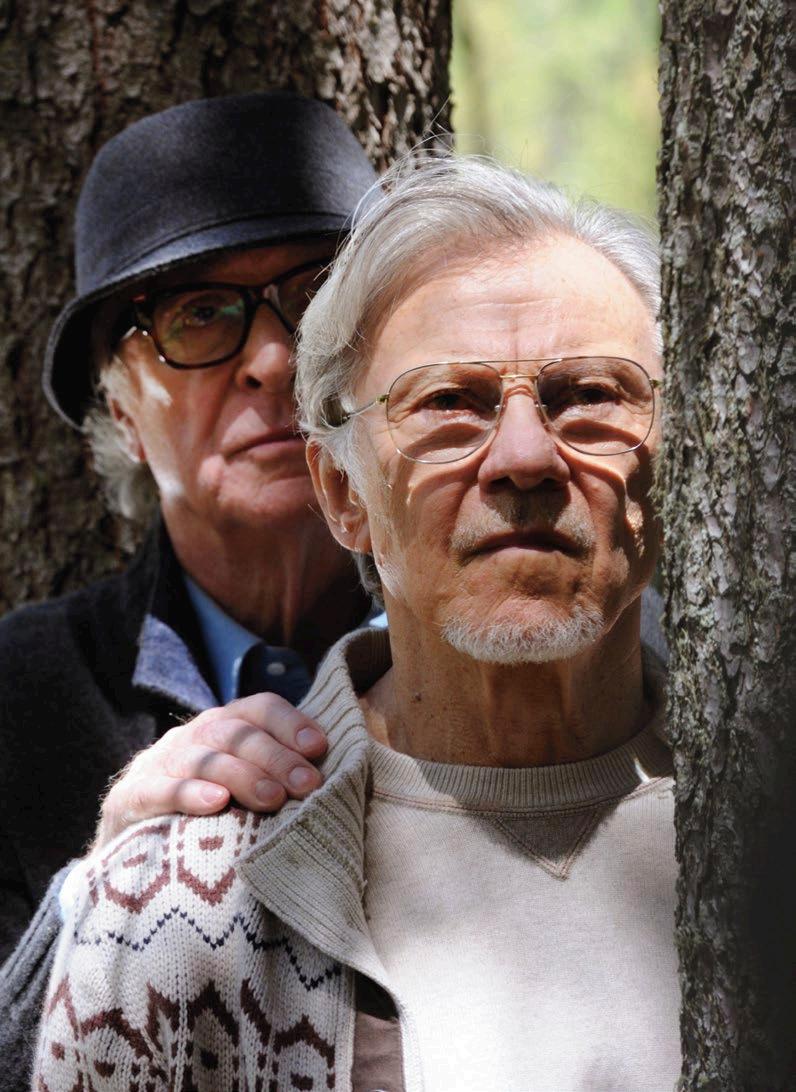 Michael Caine and Harvey Keitel getting back to nature in Youth
Michael Caine and Harvey Keitel getting back to nature in Youth
IT’S ALL ABOUT THE STARE.
At several points during our interview, Harvey Keitel fixes me with one—arched eyebrows, steady gaze, the hint of a frown. All those gangster roles have clearly left their mark, especially when you take in the sleek black suit and tinted glasses. I hope he doesn’t notice my trembling hands.
We’re here to talk about Youth, which represents something of a departure for the famously hard-boiled actor. Set in a isolated Swiss health resort that starts to resemble the Overlook Hotel in The Shining by the end, it focuses on two ageing best friends (Keitel, playing filmmaker Mick Boyle, and co-star Michael Caine, playing retired composer Fred Ballinger) who look back on their lives amid the picturesque Alpine setting.
The movie sounds rather drab on paper, but Italian director Paolo Sorrentino—here making his second English-language feature—has a wonderfully offbeat visual style, and the film delights in eccentric cameos, including pop star Paloma Faith, Miss Universe and a scarily convincing Maradona lookalike. The supporting cast is also top notch, especially Rachel Weisz as Lena, Fred’s troubled daughter and assistant, and Paul Dano as Jimmy
Reflecting on the past in the Alps: “[Paolo Sorrentino] is writing stories that concern me, about people and about how to live a life.”

Tree, a young actor researching an upcoming role (revealed late on in an hilariously dark scene).
It’s a real witches’ brew of a film, which shouldn’t work but gets by on sheer invention. So what drew Harvey Keitel to the project?
“The story itself,” he says, after an agonisingly long pause. “That and
24 THE TRAPPINGS OF YOUTH
| 01•2016 PREVIOUS IMAGE: © 2015 FOX SEARCHLIGHT

Paolo’s former work—films such as The Great Beauty and Il Divo [both set in his native Italy]. He’s writing stories that concern me, about people and about how to live a life.”
But the story in Youth is quite simple, so was it the themes that pulled him in? There’s a lot of reflection on the past, lots of quiet
agonising over mistakes made and loves lost. As an older actor (Keitel is now 76), is that the kind of subject matter he wants to explore?
“Well, that’s why we did the movie,” Keitel replies with a slight shrug, as he takes a sip of water. “That’s why I assume everyone else did it, because they saw something reflected in their
25
01•2016 | © GIANNI FIORITO
own lives.” He puts his water down and locks eyes with me. “Paolo’s work is in the area you’re speaking about, so all those who enter do so at their own risk.”
I take this as my cue to talk about Sorrentino’s surreal, idiosyncratic style, which will likely alienate as many people as it charms. Was that apparent in the script?
“Well, I think I need you to answer that question,” he says, frowning slightly. “It’s all kind of surreal, so I guess you could say that if you feel that way about it. I don’t want to define it for anybody. That’s your homework.”

place to impose things. You have to make things happen. I would say that you have to appeal to people. You need patience, understanding, psychology. When you approach that girl you want to take out, you don’t say, ‘Hey you, come out with me!’ ” He smiles broadly for the first time. “Or maybe you do, I don’t know.”

All right, then: was it a question of a film director imposing his style, or was there room for feedback and collaboration?
“Everyone has their vision, but no director worth their salt is going to impose something,” he replies, leaning forward and at last sounding engaged. “Making a movie, being in theatre or being on stage is not a
It’s significant that Keitel is far more comfortable talking about the process of filmmaking than the finished product itself. After all, he’s successfully collaborated with some of the greatest directors of all time, including Quentin Tarantino, Martin Scorsese and Wes Anderson. He’s also co-president of the Actors Studio, founded in 1947 as a place for performers to work on their craft and refine their skills.
“It’s one of the most important cultural houses we have in America,” says Keitel when I raise the subject. “It houses a standard of work that we
26 | 01•2016
THE TRAPPINGS OF YOUTH
Screen legend: with Robert De Niro in Martin Scorsese’s Taxi Driver in 1976…
© MOVIESTORE COLLECTION LTD/ALAMY STOCK PHOTO / © PICTORIAL PRESS LTD/ALAMY STOCK PHOTO
…and capturing a new generation with Quentin Tarantino’s Pulp Fiction in 1994
call the method [a technique that draws on an actor’s own experiences to help shape characters], and it sticks to that standard.”
Indeed, the struggling filmmaker Keitel plays in Youth clearly draws on his long experience of working with actors and writers. There are several amusing scenes where he and his collaborators struggle to come up with a convincing ending to the script they’re working on. Did that bring back any memories?
“Yes, I’ve been in those situations studying acting. When we were doing plays off Broadway and creating workshops and acting classes, that’s what the situations were like. You go on these expeditions with your colleagues, trying to discover how to bring this thing to life.”
One of the things that certainly brings Youth to life is the chemistry between Keitel and Michael Caine. There’s an On Golden Pond quality to their interactions—two screen legends casually batting the dialogue back and forth, although Keitel insists that none of it was improvised.
I express surprise that they’ve never appeared on screen together before, since even though their dramatic personas are very different, they feel like contemporaries.
“Well, Michael will understand and forgive me when I say he’s a little older than I am,” says Keitel, with a hint of rebuke in his voice. It’s true that Caine, at 82, is six years older. All the same, at this stage in his career, Keitel must think about unrealised roles. Is there anything he still wants to do?
“I’m sure it’s out there and I hope it’s coming towards me,” he replies, before adding in his usual enigmatic style, “As a matter of fact, maybe we should open the door—it might come in now.”
So there are no plans to retire? “We have a saying in the States: if you want to make God laugh, tell him your plans. Do I imagine giving up? No, I don’t—it’ll be given up for me by the Divine. I’ll let you know then.”
Youth is released in cinemas on January 29 and is reviewed on p18
OBSOLETE WORDS (OR ARE THEY?)
Try dropping one of these gems into conversation: Crapulous (16th century): to feel ill because of excessive eating and drinking.
Cockalorum (18th century): a little man with a high opinion of himself.
Curmuring (19th century): a low, rumbling sound produced by the bowels.
SOURCE: BUZZFEED.COM
27 01•2016 | READER’S DIGEST
Sir Ranulph Fiennes, 71, is heralded as “the World’s Greatest living explorer”. having broken several world records, he now focuses on raising money for charity through his expeditions—his target is £20m
“I Remember” Ranulph Fiennes
…getting off a ship in c ape town and a man taking us somewhere. I must have been about a year old. Another memory is from when I was about three years old, screaming on a beach because I didn’t want to go home so early. According to my mum, I was known as the “naughtiest boy at St James”, which was the name of the place where we lived in South Africa for a number of years.
…tales about my father. He was killed about four months before I was born. I was brought up with stories about him, told by my mother
and old army friends of his. I feel that I know him. I was lucky to have a wonderful, 100-per-cent great mum. Even though we didn’t have any males in the family—I had no uncles, brothers or grandfathers alive, only sisters and aunts and grandmothers— she was a fantastic mum to my three older sisters and me. I was with her the night she died at 93 years old.
…my mother saying she wanted to go back to
england. One day in the school holidays, she got my three sisters and me together and explained that because my South African
| 01•2016 28
entertainment
Photos courtesy of ranul P h fiennes

Ranulph, pictured at the summit of the Eiger, Switzerland, undertook “vertical” expeditions for six years

grandmother had died, we had no roots left there. We would be selling the house and going to England— and that was that. We were also told to stop speaking with our SouthAfrican accents.
…meeting g inny. I was 12 when we arrived in England. We found a cottage in Sussex, and the next-door neighbours about a mile away on the other side of the wood had a daughter. She was nine, I think. I didn’t actually take her out until she was 13 and I didn’t marry her until she was 23.
…going to prep school in wiltshire. I’d enjoyed school in South Africa, even
though there was a bully who used to chase boys around at break time with bamboo. Schools out there had gangs of children, which we used to join and have mock fights with sticks and fir cones. There weren’t any gangs at this English prep school, so I started one. That was unpopular—I was beaten and told there was no place for gangs in Britain. It wasn’t true, but at that particular school it was.
…wanting to be like my dad. When he was killed, he was commanding the Royal Scots Greys cavalry regiment. I’ve got pictures of him before the war leading hundreds of grey horses on exercise. So I wanted to join the army and become colonel of that regiment. But by the time I arrived in the army, you couldn’t get a regular commission if you didn’t go to Sandhurst, and you needed that to become colonel of the

| 01•2016 30
Above: Ranulph as a schoolboy in Wiltshire; (below right) baby Ranulph with mother in 1944
regiment. You can’t go to Sandhurst if you don’t have A Levels—and I just couldn’t get those. I had a shortservice commission, but that allowed a maximum of only eight years; I’d have stayed on much longer.
...leaving the army. Ginny worked for the Scottish National Trust, taking tourists around the mountains up there. They gave her a free cottage in the middle of nowhere, and I went to live there because it cost nothing and we didn’t have any money apart from her wages. We decided the only thing I could do was adventure training. I’d done that in Germany during the Cold War— teaching the soldiers how to canoe and climb to stop them beating each other up in the canteen when they were bored.
…auditioning for James b ond. One day a person delivered a note from the William Morris Actors Agency, which said that Cubby Broccoli—who made the Bond films —was fed up with George Lazenby because he was asking for too much. Broccoli decided he’d find somebody who did Bond-type things and train that person to be an actor.
They approached about 200 of us from all over the place. I auditioned because it allowed me to have a free rail ticket from Inverness to London, which I wouldn’t have been able to afford otherwise. This enabled me to
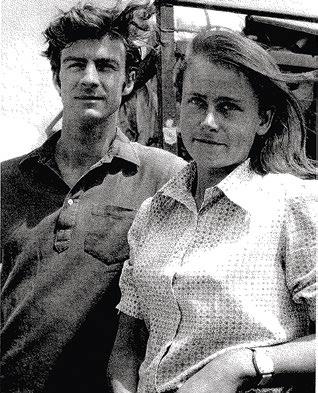
Ranulph was married to his first wife Ginny for 38 years before her death
go to the Ministry of Defence, where they were looking for an ex-officer to lead an expedition in Canada with the BBC covering it.
Of course, I had to audition while I was down there. For some reason— God knows why—I got into the last six. Having practised Shakespeare the night before, I got into the room where Cubby Broccoli was smoking a cigar, with director Guy Hamilton just over his shoulder.
Broccoli took one look at me and said to Hamilton, “This one looks like a farmer. Look at his hands.”
Even though I had proper fingers in those days, they apparently weren’t what they were after. Still, I got the expedition and we never looked back.
Reade R ’s d igest 01•2016 | 31
On the summit of Everest with Sherpa Thundu

…finding the l ost c ity. This particular expedition took 26 years on and off, during which we did eight long expeditions all for the same purpose. Each one took a long time to plan, with British Petroleum dropping off fuel 300 miles into the sand dunes. Having started in 1968, we finally succeeded in finding the Lost City [of Iram] in 1992. After many false alarms, it was a very special occasion.
…going around the world. I’ve spent over 40 years trying to break world records, but the most difficult was endeavouring to be
the first humans in history to go around earth’s vertical circumpolar circumference: 32,000 miles without flying. People try to cross the whole of Antarctica or the Arctic Ocean, which is 2,500 miles of floating ice. We did both ends of the earth and a whole load of other problems in a single expedition. No other humans have done it since.
…realising having a doctor is a very sensible thing. Most of the expeditions I’ve done have been with a fellow called Michael Stroud. You’re always thinking about
| 01•2016 32
how to deal with whatever’s going on with your body—whether it’s gangrene or frostbite or fillings falling out. Michael is a very good doctor, so having him weigh up whether or not gangrene is getting to the stage where you’re going to have to have something cut off, or whether actually he can ward it off with medicine for bit longer, is hugely beneficial.
…keeping an eye on our competitors. We have an intelligence unit that listens in to our known rivals. We’ll get an emergency phone call saying soand-so is trying to do the first crossing of Antarctica in winter, and we’ll know we better put our shoes back on again. We’re like any business. There’s another expedition that I’d dearly like to do, but I can’t talk about it because the Norwegians might make their own efforts. They’ve been a pain in the neck for 40 years.
…getting rid of my fingers. I can’t actually remember very much about the actual process of cutting them off [Fiennes performed selfamputation after his left hand was afflicted by frost bite], but I know that it took two days to get through the thumb because I had to turn it round slowly in the vice. My wife brought me cups of coffee constantly. I’ve still got them. I lost them for quite a while but then I found them again—I’d put them in a tin and forgotten. It’s very
difficult to chuck them away when you’ve lived with them for 55 years.
…losing g inny to cancer after 38 years of marriage. It was the end of the world. Totally. Nothing was any good. We hadn’t had any children and I was dejected and useless. For months, I was self-pitying and not doing anything positive, and I had to force myself out of it. I did that by saying to myself, The one thing I’m scared of it vertigo, so I’ll have a go at is dealing with it. That might take me out of this nightmare existence. I only spent about six years doing vertical things—mountains and whatnot. I didn’t enjoy it terribly much so I switched back to horizontal trips.

Ranulph was the oldest Brit to run the marathon des sables last year
01•2016 | 33
r eader’s d igest

…giving millions to charity. Prince Charles told us we must start using expeditions to support charities, which we hadn’t been doing. When my wife died, I really appreciated Marie Curie Cancer Care so we started raising money for them. The charities are very honest and they know their own ability to raise money. I ran the Marathon des
Ranulph and his second wife
Louise tend to an orphaned lion cub
Sables last year as opposed to in 2014, for instance, because the charity said that if I waited one more year, I’d be the oldest Brit to run it and that would enable them to make £2m. That’s also why I did Everest three times before I got to the top—I wouldn’t have gone back otherwise. I want to raise at least £20m for charity by the time I die.
| 01•2016 34 i remember
…lecturing in chester a year after ginny’s death. A very good lady named Louise Millington said I looked tired and offered me some tea. We met up a bit later, and we got married in 2005.
…becoming a father. Louise and I had a daughter in 2006. It’s certainly changed my life, and I now think that if Ginny and I had had children we might not have done all that we did. My wife is a wonderful mum, which is lucky because in order to make a living I can’t do it from home. I lecture all over the world because it’s the only way that expedition people can make a living. Nobody pays you a penny for all the organisation, planning and execution.
...sitting with my family and watching tv. That’s when they’re not carrying water or hay to one of my wife’s 29 horses. My professional
pressure is self-induced because we want to break records and we have a desire to get big chunks of money for our charities, but I aim to be around my children [Fiennes is also a stepfather to Louise’s son] and my wife as much as I can. I’m trying not to do lectures at weekends, but it doesn’t always work.
…not thinking about how i’d like to be remembered.
In 1984 The Guinness Book of World Records described me as “The World’s Greatest Living Explorer”, but when you’re dead, you’re dead —it doesn’t really matter, does it? Having said that, I wouldn’t mind having something on my tombstone like, “He beat the Norwegians.” As told to Fiona Hicks
Heat: Extreme Adventures at the Highest Temperature on Earth by ranulph Fiennes is out now
in QU isiti V e minds
children ask the best questions, as these examples prove:
“does the tooth fairy work on mondays?”
Quincy, six years old
[in a pitch-black room] “Where did my eyes go?”
bryce, two years old
“every time you taste something new, do you grow a new taste bud?”
Jonas, six years old
sOUrCe: BUZZFeed.COm
Reade R ’s d igest 01•2016 | 35
FOR MORE, GO TO readersdigest.CO.UK/entertainment
Health Tips From Around e World

Our rates of obesity are increasing worldwide, but some nations have triedand-tested ways of eating, relaxing and exercising that keep them well
HERE ARE SOME HEALTH TIPS FROM ACROSS THE GLOBE:
France
Eating at set times with family so you’ll enjoy your food is the French way. ey have fewer issues with obesity than us, yet they eat real butter, cream and other artery-clogging foods. Bolting your food in front of the television just encourages overeating. Be chic—enjoy your food.
Iceland
Our Icelandic friends eat a lot of omega-3-rich fish and their levels of seasonal affective disorder, known as the winter blues, are lower than
average. ey also beat us in the Eurovision each year! Cutting down on red meat is a good way to help prevent heart disease.
A Mediterranean diet
It’s known world over as one of the healthiest. In the Med they eat all food groups in moderation, with plenty of olive oil.
e Netherlands
For most of us exercise is a chore, but the Dutch exercise every day when they cycle to work. It’s not always practical to get on your bike here, but if you walk and cycle as much as you can, you will feel the benefits.
Italy
Seasonal, fresh produce makes up a big part of what Italians eat each day. By eating fresh they pack in maximum vitamins and taste. Out-of-season supermarket fruit and veg may have travelled the globe before you pick it up. Buy from markets when you can, or choose in-season produce.
PARTNERSHIP PROMOTION

Ireland
Communication is key to sharing problems. It lowers blood pressure and boosts your sex life. e Irish can talk, and talk well. Plus, there’s plenty of iron in Guinness!
India
Indian food is very popular in the UK. Good, then, that it’s packed with spices that have health benefits. Researchers have found chemicals that prevent Alzheimers in turmeric, and chilli peppers aid weight loss because they speed up your metabolism.
Spain
Take an afternoon siesta for more brainpower. A six-year-long study indicated that a 30-minute power nap taken three times a week lessened your risk of heart disease by 37%.
Make the change
We can learn a lot if we scrutinise diet and health habits from around the world. Not only will your health improve as a result, it’ll remind you of some amazing holidays you’ve had and maybe even inspire you to take a trip.
For more information about treatment options for these and other conditions, visit our online clinic at www.onlineclinic.co.uk/readersdigest.html

The Evolution of Dieting
Far from being a modern phenomenon, an obsession with what we eat has a long and convoluted history. But will it ever end?
By Vic T ori A F LET c HE r
38 HEALTH
© INTERFOTO/Al A my S TO ck Ph OTO
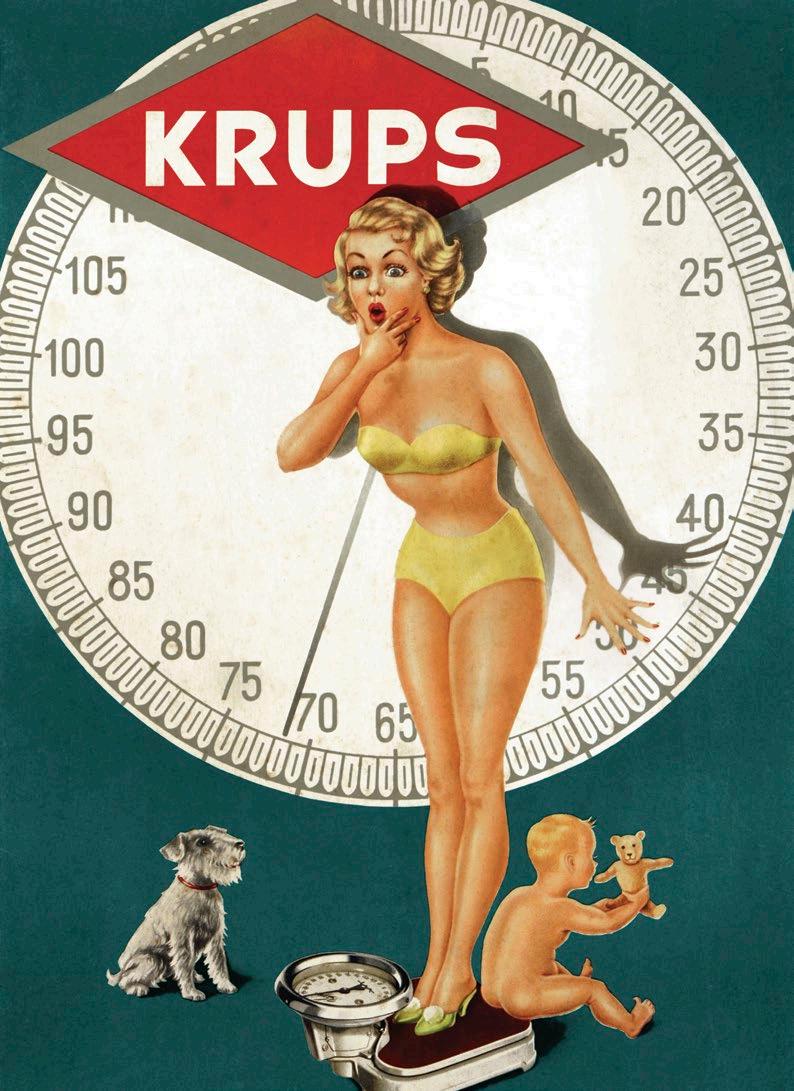
If you w I sh to lose we I ght, you need to eat one meal a day of fatty meat covered in sesame seeds, apparently. But before you rush to the shops to test it out, wait a moment. This isn’t the latest low-carb diet fad to sweep Britain, nor is it the conclusion of a longawaited scientific study. It was written by Hippocrates—the father of Western medicine—more than 2,400 years ago.

Allied propaganda depicted German women as fat, and the skinny, boyish Flapper fashions of the 1920s followed
Our obsession with diets is nothing new. Dr Louise Foxcroft, author of Calories and Corsets: A History of Dieting, says medicine was originally based on what we eat. “When you were ill, the first port of call was your diet,” she states. Although not all early diets would have met with approval today—one writer of the Middle Ages declared fresh egg yolks, eight slices of bread and half a bottle of wine to be the key—they were at least motivated by a desire to live long and healthy lives.
But as the centuries rolled by, there was a pressure to look good too. Eating soap was suggested for its laxative effects, and Lord Byron’s followers drank vinegar to stay slim. Says Dr Foxcroft, “The real tipping point for dieting came with the arrival of newspapers and magazines. It was the mass media that created the diet culture we see today.”
By the 1900s, dieting, body shape and the media were inextricably linked. Allied propaganda depicted German women as fat—and the skinny, boyish Flapper fashions of the 1920s followed, triggering moral outrage in the press and mass dieting.
| 01•2016 40 T h E EVO l UTION OF DIETING
© J EFF mORGAN 13/Al A my S TO ck Ph OTO / © J EFF mORGAN 15/Al A my S TO ck Ph OTO
But if we’ve always taken an interest in body shape and slimming, how have we become so fat?
In the last half century we’ve been offered a multitude of ways to lose weight, from eating little to gorging ourselves on meat. Yet at the same time, obesity has escalated from one in 100 of us to more than a quarter.
Andrew Hill, professor of medical psychology at the University of Leeds, says, “None of these diets have inherently magical properties. They share in offering someone a strategy for energy-intake reduction. But the environmental and biological forces that lead to eating and lack of energy expenditure are often too strong. We often blame ourselves for failing, as well as blaming the diets. In reality, it’s simply an unfair fight.”
Back in the 1970s, however, we had no idea what lay ahead. Images of super-thin models were on every magazine cover, and very low energy diets of under 1,000 calories a day —not seen since the 1920s—were the fashion.
According to the British Nutrition Foundation, crash diets such as these can trigger a change in our bodies called ketosis that may suppress appetite and give us a weight-loss boost (even the NHS recommends them for the morbidly obese). But they come with a warning: they can be hard to follow and cause the body to break down muscle, lowering metabolism so you gain weight later.
We’ve been offered a multitude of ways to lose weight, yet obesity has escalated from one in 100 to more than a quarter

01•2016 | 41 rEA d E r’s d ig E s T

Curvy figures were popular in the 1950s, as shown by Jane Russell; (right) Jane Fonda workout videos from the 1980s
As Professor Judy Buttriss, director general of the British Nutrition Foundation, says, “If you get the fat very low, it may affect your choice of foods that are satiating. The main thing to help you lose weight is to reduce calories.”

By the 1980s, a new era of healthy living had been heralded by the arrival of aerobics, lycra and low-fat dieting. Offering more to eat than very low energy diets, their focus was on getting less than ten per cent of calories from fat.
This was partly because scientists were discovering strong links between saturated fat and heart disease. Even food manufacturers got in on the act, creating low-fat cheeses, yogurt and ready meals, but a flipside quickly emerged. Slimmers felt less full and fat was often replaced by sugar.
During the 1970s and 1980s, another dieting trend came onto the block. A hit in the US first, lowcarbohydrate diets soon went transatlantic. These diets were met with joy from a hungry public: they allowed meat, cheese, cream and butter, and despite a bit of smelly breath, people lost weight. But no sooner does one doctor create a diet craze, another knocks it down. Medics quickly warned that eating fatty, meaty foods over many years was proven to increase the risk of heart disease and bowel cancer, so it shouldn’t become a way of life.
So which one works? Last October, scientists compared lowfat and low-carb diet studies. The Lancet research concluded that over a year, people on low-carb diets lost around two pounds more than those on low-fat diets. “Health and nutrition guidance should cease recommending low-fat diets for weight loss when
| 01•2016 42
© P I c TORIA l P RESS lTD /Al A my S TO ck Ph OTO / © l y NNE S UT h ER l AND /Al A my S TO ck Ph OTO
compared with other similar intensity dietary interventions,” announced the study’s authors. It seemed for a moment as if the mystery was solved, until the scientific community decided the study really showed that both diets work—it just depends what sort of dieting you “enjoy”.
Professor Buttriss puts it in a nutshell: “As long as there’s some evidence, one is no better than the other. It just depends on what works for you. Ultimately, what goes in your mouth must provide a good range of nutrients but be restrictive enough to help weight loss.”
Naveed Sattar, professor of metabolic medicine at the University of Glasgow, says it’s perhaps time to take stock of what we’re doing to ourselves. “You cannot change your diet overnight as your taste buds are used to certain things, such as sugar. It’s like a supertanker—you have to slow down carefully before you can stop and start to reverse. It takes time.”
Perhaps key to all this is evidence that, when we don’t follow a set diet plan, we don’t seem to know what we’re eating. Every year, the UK’s National Diet and Nutrition Survey maps the eating habits of 7,000 people and informs health policy. Two years ago, they decided to double-check the food diaries of 400 participants using urine tests. They found that overall calorie intake had been under-reported by a third. Men
The fundamental thing is you can’t change your diet overnight, as your taste buds are used to certain things, such as sugar
aged 16 to 49 ate 1,000 calories a day more than they thought.
You might assume we’re all chubby liars, but we’re not. We just don’t realise the portions we’re given in cafes, and supermarket packets are larger than they should be.
Susan Jebb is professor of diet and population health at the University of Oxford. She says experts have known for decades what we should be eating. “Official advice on what we should eat hasn’t really changed much since the 1980s,” she says. “We’re slowly moving in the right direction except for calorie intake.”
What is this right direction?
Professor Buttris says pivotal research shows a third of our diet should be starchy carbohydrates. “This must include 30g a day of fibre to protect bowel health—a new recommendation from government scientists of which many people are completely unaware,” she warns.
Fruit and veg should make up another third. Five-a-day is the minimum, not maximum, we should
Reade R ’s d igest 01•2016 | 43
aim for, and some studies suggest seven- or eight-a-day could protect heart health.
The final third is divided into three. Meat, fish, eggs and beans should make up 12 per cent of our diet —often far less than a single portion of steak.
Dairy products should make up 15 per cent of our daily intake. Despite the headlines, butter isn’t “in” or “out”—just try to use rapeseed or olive oils most of the time, which are monounsaturated fats that reduce levels of unhealthy cholesterol in the blood.
complex than cutting calorie intake across these food groups by 500kcal a day to lose 1–2 pounds per week.
So in this complicated world of ideal body shapes, fad diets and tempting treats, will we ever reach the point where dieting doesn’t exist?

We have body stereotypes for men and women that are out of the natural range
Sugary, fatty snacks are probably our biggest problem and should take up eight per cent of our diet— including new government sugar advice to consume no more than six teaspoons a day. Currently, a fifth of what we eat is high in fat and sugar.
And if you want to lose weight? Most scientists advise nothing more
“Being only mildly overweight isn’t disadvantageous for health as long as dietary choices are sensible and there’s regular engagement in physical activity,” says Professor Hill. “The drive for what could now be regarded unreasonably low weight—a BMI of 20 or so in anyone aged 30 or over—is aesthetic rather than for health. We have body-shape stereotypes for both women and men that are out of the natural range.”
As Hippocrates knew 2,400 years ago, what we eat shouldn’t be made complicated or shift with fashions. It should just be about our health.
Some negative reviews are valid. Others are questionable...
“The animals at the zoo looked very sad and made our children cry. Can’t they train them to look happy?”
SOURCE: TELEGRAPH.CO.UK
| 01•2016 44 T h E EVO l UTION OF DIETING
ro s TA rs
ZE













7 Surprising Secrets Of Slim People
BY SUSANNAH HICKLING

Susannah is twice winner of the Guild of Health Writers Best Consumer Magazine
Health
Feature
WITH THE CHRISTMAS AND NEW YEAR BLOW-OUTS BEHIND US, how can we avoid piling on too much weight in the months ahead?
1
LOAD HALF YOUR PLATE WITH VEGGIES FIRST. Then serve yourself protein. Carbs come last. This formula works because vegetables are filling and nutritious, and have fewer calories than meat and pasta. You won’t be eating less, just more healthily.
2
EAT AN AFTERNOON SNACK. The time of day when your diet willpower is most likely to waver is around 4pm. But rather than fighting it (or feeling wretched after scoffing a packet of chocolate digestives), opt for a sensible afternoon snack such as yogurt and berries.
3 DRINK ONLY THE CALORIES YOU REALLY LOVE. And, even then, drink the smallest amount you need to feel satisfied. This means skipping flavoured coffee drinks, pop and juice as much as possible. Water is always best.
4 FILL UP ON FAT. Sounds counterintuitive? The fact is that healthy fats, including monounsaturated and polyunsaturated fats, and omega-3 fatty acids (found in olive oil, walnuts and salmon respectively) can help with weight control. They make you feel full.
5COUNT PORTIONS NOT CALORIES. Counting calories is a short-term fix, not a lifelong solution—and may be less healthy. For example, you might reach for a 100-calorie snack
| 01•2016 46 HEALTH
© LUMI IMAGES/ALAMY STOCK PHOTO / © ALEXANDER RATHS/SHUTTERSTOCK

pack of diet biscuits but, in the long run, almonds are a healthier choice in spite of containing 130 more calories. Why? Because they’re packed with minerals, vitamins and healthy fats.
6 BULK UP ON FIBRE. Fibre keeps you regular and makes you feel full. It also slows the rate at which your stomach empties its contents. This gives a more moderate increase in blood sugar, helping maintain energy and damp down appetite.
7 EAT TREATS 20 PER CENT OF THE TIME.
If you adopt the 80-20 rule—eat fruit, veg and protein 80 per cent of the time and enjoy little luxuries like a few squares of dark chocolate or the occasional meal out the other 20 per cent—you’re more likely to stick to your diet.
SCENT AWAY
Think you’re giving friends and relatives a boost by visiting them in hospital? You could actually be making them worse if you wear perfume or aftershave, according to an editorial in the Canadian Medical Association Journal. Research has shown that around 30 per cent of people are sensitive to scent worn by others, and 27 per cent of asthmatics are adversely affected. Hospital patients are more likely than average to have asthma or other upperairway or skin sensitivities.
So next time you wander down the ward to visit loved ones, why not make sure you’re scent free?

01•2016 | 47
Seeing is believing




Visionace® is based on extensive research and has been specially formulated by Vitabiotics’ nutritional experts to provide specific nutrients to support your vision.
Each formula provides comprehensive Visionace® micronutrient tablets with vitamins A, B2 and zinc which help to maintain normal vision , plus Bilberry extract and Lutein
Visionace® Plus provides Visionace® micronutrient tablets plus additional Omega-3 DHA capsules in a convenient dual pack. DHA contributes to the maintenance of normal vision †
Visionace® Max also provides DHA from a combination of both Omega-3 fish oil and Red Krill oil, in an advanced dual pack. Visionace® Max offers the maximum support in the range.









*Nielsen GB ScanTrack Total Coverage Value Sales 52 w/e25 April 2015. † A beneficial effect is obtained with a daily intake of 250mg of DHA. ADVISCONP 21-09-15E ORIGINAL PLUS OMEGA-3 MAX from Britain’s No.1 Vitamin Company* From , Superdrug, Holland & Barrett, supermarkets, chemists, health stores & www.visionace.com
with vitamins A, B2 & Zinc which help to maintain normal vision
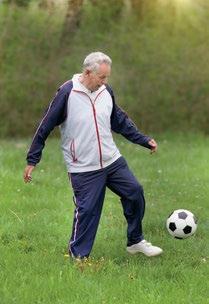
MEN’S HEALTH: THEY THINK IT’S ALL OVER…
A new version of soccer is taking the nation by storm— walking football. One foot must stay on the ground at all times and no running is allowed. There’s increasing evidence that this kind of moderate exercise is beneficial to health —if walking football can help stave off obesity, diabetes, heart disease and more, it’s certainly a beautiful game!
To find a club near you, go to walkingfootball united.co.uk

Feeling Restless
What is restless leg syndrome? It’s a common but puzzling disorder affecting one in ten people. Sufferers have an irresistible urge to move their legs. It often happens at night, causing sleeplessness. And now new American research has linked the syndrome with a higher risk of stroke and kidney and heart disease.
What causes it? Some experts believe it’s a problem with the brain chemical dopamine, which helps control movement. It can also be caused by irondeficiency anaemia, diabetes, rheumatoid arthritis or Parkinson’s. Antidepressants, antihistamines and some drugs that treat blood pressure could make the condition worse.
What can I do about it? Lack of exercise, smoking, being overweight and stress are thought to be triggers. Clean up your lifestyle and take daily exercise—but not just before bed.
READER’S DIGEST 01•2016 | 49
Struggled To Hear Loved Ones This Christmas?
HOW MANY CHILDREN did you have around the Christmas dinner table this year? Did you struggle to hear them? With so much to celebrate around Christmas time, the noise of children with the hustle and bustle can be overwhelming, and things can be missed.
Being able to hear your grandchildren is a priceless joy, and having children and grandchildren together at Christmas is special for all involved.
1 in 6 people suffer from some form of hearing loss in the UK, with figures set to raise to 1 in 5 by 2035.
If you’re one of the 11 million people suffering in silence, you’re not alone. During the New Year, let’s do something about it!
Shocking research has suggested
HEARING FACTS
1

that 41% of those with hearing loss feel they were missing out on aspects of their life due to their loss of hearing.
If you felt you missed out this Christmas and would like to reconnect with your family during the New Year, take the first step and seek help today. It takes little time and could mean a whole lot to you and your family.
For all the information you need, head over to readersdigest.co.uk/ hearing. New Year, New You, Better Hearing.
1 1 in 6 people in the UK suffer from some form of hearing loss.
2
2 Approximately 6.7 million people could benefit from using hearing aids (Action on Hearing Loss Statistics).
PARTNERSHIP PROMOTION
Start Slow
Walking for fitness? Master these tips one at a time.
Breathe Inhale through your nose and let your lower lungs fill with air. As you exhale, flatten your stomach and force the air out through your mouth.
Lean in Hinge forward slightly from your hips and lead with your belly. Your upper body will tilt just enough to keep your shoulders above your hips.
Engage your abs This will keep you walking in a straighter line. Think of your pelvis as a bowl of soup— if you tilt it too far forwards or backwards, the soup will spill.
Shorten your stride Focus on extending the leg behind you as you
lean forward, rather than the leg in front. This reduces strain on your knees, calves and shins.
Swing your arms This sets your pace. Bend your arms at a 90degree angle and swing them front to back in the direction you’re going.
Align your spine
Place one hand on your lower belly and one hand under your collarbone.
Lift up gently and lengthen your neck until you feel a stretch —this is an efficient walking posture.
KEEP AN EYE ON IT
Your peepers provide an insight into your health. Talk to your doctor if you’re worried about these symptoms:
1. Bulging eyes This can be a sign of thyroid eye disease
2. Yellow eyes Hepatitis and cirrhosis can turn the whites of eyes yellow.

3. Pupils of different sizes This can signify a brain condition, such as meningitis, stroke or a haemorrhage.
4. Redness, pain and inflammation
This may be scleritis—a symptom of lupus or rheumatoid arthritis.
5. Eye spasms These are merely harmless muscle contractions
READER’S DIGEST 01•2016 | 51
BUDIMIR JEVTIC/SHUTTERSTOCK / © JL-PFEIFER/SHUTTERSTOCK / © RADIUS IMAGES/ALAMY STOCK PHOTO
©
Why Timing Can Be Everything
By max pem B erton

Max is a hospital doctor, author and newspaper columnist
“Richa R d needs his medication,” says the nurse, with an air of desperation usually only reserved for when the vending machine has run out of Kit-Kats.
“Right,” I say at the other end of the phone, still unclear as to what warranted the urgency.
“His chart has run out and it needs to be re-prescribed,” the nurse continues, with increasing concern.
I’m mildly irritated by this. The nursing staff where I work are usually calm and collected. But when the nurse paged me, she put it out as a “fast-bleep”, which is usually reserved for cardiac arrests and the like—not rewriting drug charts.
“Ok, well, I’m on another ward dealing with a sick patient, so I’ll be along when I can. Say, half an hour or so.”
This was clearly not what the nurse wanted to hear. “But he needs it at 9.30,” she says. I look at my watch—it’s 9.20 already.
“Well, he’ll have to wait,” I retort.
“But he always has it at 9.30,” replies the nurse.
“And today he’s going to have it a little later. Perhaps the change will do him good,” I conclude and hang up.
this, i now R ealise, was a serious error of judgement. I’d failed to understand that Richard’s medication did have to be given at exactly 9.30. This wasn’t for any pharmacological reason, but because Richard has been in hospital for 20 years and is utterly institutionalised.
Humans are creatures of habit—it helps us make sense of
| 01•2016 52 H ea Lt H

our world. Those in institutions rely on the structures imposed on them to bring meaning and predictability in a place where they have no control over their lives. In the past, many were locked up indefinitely in large asylums, but since the 1990s these have all but gone.
But there are small enclaves of the old system, and I’m working in one. These are secure units for those with mental illness who have committed crimes—a miniscule proportion of the mentally ill, but they still exist. And it seems that we, medically, legally and socially, are at a loss to know what to do with them. Their illness, combined with the fact that they’ve committed often violent crimes, means many will never be out of institutions.
At times, I feel this place is almost unbearably bleak. But then I read the reports about some of the crimes and I oscillate between sorrow for their current predicament and revulsion for what they have done. I want to offer a solution to this problem, but I can think of none.
A quarter of an hour later, I get fastbleeped again. Richard has smashed his wardrobe and cut his head. When I arrive, he’s on the floor of his room, crying, surrounded by nurses. This is my fault. I should have realised the importance of his medication—when it’s not on time, his world collapses.
I rewrite the drug chart, apologise profusely and walk out. Then I make myself a cup of tea, as I always do at this time of the morning.
I on
M a 01•2016 | 53
Illustrat
by Magu
Milk Makes You Phelgmy When You Have a Cold

WHere did tHe mytH come from?
As with so many of these myths, this is something my mum swears by. The worst part of having a cold as a child was that we were banned from having chocolate biscuits—my mum said the chocolate would make the phlegm worse. I suspect it was a ploy to keep the biscuits to herself.
The myth likely dates back to the 12th century, when the physician Moses Maimonides recommended removing dairy products to improve congestion. The idea is also in ancient
Chinese medicine. While not based on fact, it’s probably because dairy products are of a thicker consistency and so people assumed it must make the body’s fluids thicker too.
WHat’s tHe trutH?
Various studies have been done, such as infecting volunteers with the cold virus and giving some dairy products and others none. There was no difference between the two groups. In fact, all studies have concluded that milk has no effect on your phlegm. Further studies have shown there’s no difference in those who drank milk and those who drank water.
so, tHere’s notHing to Worry aBout?
Milk will make no difference to your phlegm when you have a cold, so feel free to eat as many chocolate biscuits as you like—they may not be actually good for you, but they certainly won’t make your cold any worse. And when you’ve got a cold, you need a treat. Mum, I hope you’re taking note.
Illustrat I on b y D a VID H u MPH r IE s | 01•2016 54 H ea Lt H
FOR MORE, GO TO readersdigest.co.uK/HeaLtH
medicaL mytHs—Busted!































































Why You’re (Probably) Happier
N ow
Do you ever wonder if your happiest days are behind you?
Think again. A growing body of research has discovered something very unexpected and rather wonderful
BY AMANDA RILEY-JONES
BY DAVID HUMPHRIES
ILLUSTRATION
56 INSPIRE

OUR HAPPINESS LEVELS TEND TO FOLLOW A U-SHAPED
CURVE as we move through life, according to research by Professor Andrew Oswald from the University of Warwick. Multiple studies report that people feel happy when they are young—this dips in their 20s and 30s, hits the lowest point in the mid-40s, then rises consistently as people move into older life.
“It’s taken me 20 years to discover this U-shaped curve,” says Professor Oswald, who works at the interface between behavioural science and economics. “In the early days, I didn’t expect these results—because physical health deteriorates through life, one would expect emotional well-being to drop also.
“But we’ve studied over five million people and found the same pattern all over the world. I think more or less everyone now accepts that older people are happier (with the exception of the last five years when illness strikes and happiness tends to fall off). This could be classified as a truly fundamental discovery about humans.”
A huge Gallop poll in the US found the same decreasing happiness from 18–50, followed by a progressive bounce back after 50. (Remarkably, octogenarians were found to be the happiest of all.) And a Eurostat survey last year reported a clear “retirement effect”, with 65- to 74-year-olds across the UK, Holland, Switzerland and Sweden all feeling happier than their 16- to 25-year-old counterparts.
That might not have surprised the late, great professor of neurology Oliver Sacks. He spoke of how his father experienced being in his 80s as one of the most enjoyable decades of his life. Sacks described how both he and his father experienced “an enlargement of mental life and perspective”, and a sense of history not possible earlier in life. He thought of old age as a time of leisure and freedom, “freed from the urgencies of earlier days”.
WHAT’S GOING ON?
“The shape of the curve makes sense. The drop in happiness in the 30s and 40s coincides—for most people—with the pressures of work, having a mortgage and raising young kids,” says Vanessa King, lead positive psychologist for the notfor-profit organisation Action for Happiness, which runs courses and events to build psychological well-being.
“From our teens to midlife, we’re often comparing ourselves to others, thinking about where we are versus where we want to be. When we’re
| 01•2016 58 WHY YOU’RE (PROBABLY) HAPPIER NOW
older, we become less worried about what others think,” she explains.
Steve Dobson, a 54-year-old NHS administrator from Kent, says, “I was a self-conscious youngster and feel much happier after turning 50. My confidence has increased as a result of my life experience and now I don’t care what people think of me. For the last four years, I’ve been getting up on stage to do a cabaret act in London and Manchester. “I kept failing my driving test because of nerves, but I tried again when I was 52 and passed. I had more of a ‘Well, I’ve been here before’ attitude. You cope better with setbacks when you’re older.”
terms with our weaknesses and then become more sanguine. But the apes study has shaken up social scientists’ theories on this.”
COULD IT BE
THAT
THE ORIGINS OF OUR U-SHAPED HAPPINESS LIE PARTLY IN THE BIOLOGY WE SHARE WITH OUR CLOSEST COUSINS?
Researchers familiar with individual apes in zoos, research centres and a sanctuary made a fascinating observation: orangutans and chimpanzees also have a midlife crisis. Could it be that the origins of our U-shaped happiness lie partly in the biology we share with our closest cousins?
“My instinct
is that we need to find a theory that fits both humans and apes,”
“Older people worry less about the small things and have a greater sense of what really matters,” continues Vanessa. “As we age, we tend to become more appreciative of the simple things in life and more aware of what makes us happy. We know ourselves better.”
Professor Oswald thinks there could be a different explanation for the curve. “The standard theory used to be that we set off with high aspirations but by midlife realise how tough they are to achieve. We adjust our expectations, come to
Professor Oswald continues. “It has raised the possibility that we’re looking for a physiological or hormonal explanation. Or perhaps the traditional human theory might work. Apes have a social structure like us. We are right up against the edge of what’s known. Now we need to get to the bottom of it.”
HOW TO BOOST YOUR WELL-BEING
Small changes can lead to a big difference in how we feel. “Try to go all day without complaining or moaning—even about the weather,” says Professor Pine. “Compliment,
READER’S DIGEST 01•2016 | 59
HOW HAPPY ARE YOU?
“Research has found that happiness is a set of habits,” reveals Professor Karen Pine, one of the top psychologists behind Do Something Different, an organisation that offers online programmes to help people live more fulfilling lives. “When asked, most people say that they would rather have more happiness than more wealth. And yet so few of us actually stop and ask ourselves what we’re going to do for our happiness today? Our courses are about giving you those happy habits.”
Try Professor Pine’s quiz below, rating your answers from 0 (“never”) to 10 (“a lot”). See the full-length version at dsd.me
1. How often do you go out of your way to help or be kind to others?
2. How often do you put effort into the relationships that matter most to you?
3. How often do you take the time to notice the good things in your life?
4. How often do you spend at least 30 minutes a day being active?
5. How often do you do things that give you a sense of purpose?
Visit actionforhappiness.org for more
■ 41–50 Congratulations, you’re at the highest level of the scale! Can you share your joyful spirit and spread happiness to more people?

You do lots of things that happiness expert recommend. Honing your habits will help you get even more out of life.
■ 21–30 You have quite a few happy habits. Try to build more into your everyday life for more happiness.
You’re not doing many of the things that scientists know tend to make people happy.
Just a few new habits could increase your happiness substantially.
Be kinder to yourself and try to notice the sunshine behind the cloud.
WHY YOU’RE (PROBABLY) HAPPIER NOW | 01•2016 60
© SYDA PRODUCTIONS/SHUTTERSTOCK
praise and point out the good stuff. Noticing the good things in life helps ward off low mood. And cheerful people are nicer to be around!”
Shaking up your routine is rejuvenating and puts you back in charge of your life. “Whether it’s trying a different supermarket or visiting another country, exploring new territory will give your brain a jolt of freshness,” she adds.
Bridget Alexander, 64, a retired ad sales director from Suffolk, says, “I’m happier in my 60s than I was in my 50s. I’ve made the transition from London to a beautiful market town, found a new role and established
MY MOTTO IS: KEEP SMILING AND THE WORLD SMILES BACK
myself in the local community. I’ve joined three choirs and found huge fulfillment in using my sales skills to fundraise for local charities. Getting out to meet new friends and achieve something is really important at this stage of life.”
Engaging yourself is a key element in staying happy. “Whether it’s learning a function on your mobile or a few foreign phrases for your holiday, challenging your brain keeps you alert and may even slow the ageing process,” says Professor Pine.
Carol Clapshaw, 65, a retired office manager from London, says, “Life is much more fun now I’m in my mid-60s. I retired two years ago and I’m free to do whatever I feel like doing. Financially I’m comfortable, although not loaded, and my philosophy in life is to laugh every day. My motto is: keep smiling and the world smiles back.”
Vanessa King is passionate about the need to work at being happy. “People who are happiest engage in life, rather than letting it pass by,” she says. “It’s not about watching TV all week and expecting happiness to come to us. We have to put attention, effort and energy into nurturing it.” She says research— which is examined in detail in her book 10 Keys to Happier Living shows there are areas where taking action makes us happy:
GIVING Do things for others.
RELATING Connect with people.
E XERCISING Take care of your body.
APPRECIATING Notice the world around you.
TRYING OUT Keep trying new things.
DIRECTION Have goals to look forward to.
RESILIENCE Find ways to bounce back from problems.
E MOTION Take a positive approach.
ACCEPTANCE Be comfortable with who you are.
MEANING Be part of something bigger than yourself.
READER’S DIGEST 01•2016 | 61
Surprisingly, the first “key” is about other people’s happiness. “Giving to others can be a powerful way to increase their happiness—and ours. We’re social creatures and need a sense of purpose and connection to others. Older people who volunteer are both happier and healthier.”
Truska Gorrell, 72, a retired teacher from Canada, says, “I was a highschool teacher in my early days and have come full circle in retirement.
I help two of my grandkids with their homework and volunteer with young struggling students at the local high school. Maybe that is part of the joy of getting older...being able to use the skills developed in the first half of life, to help people in the second half. There’s peace to be found in later life.”
Being part of and contributing to something bigger than ourselves adds meaning to everyone’s lives, whatever age—whether it’s being a grandparent, joining a club or going to a place of worship. Especially after retirement, it’s crucial to find a sense of purpose.
Thankfully we become more
resilient with age and a major part of this is the way that older people think. “It’s important to limit any damaging thought patterns. For instance, if health problems have taken their toll, focus on what you can do rather than what you can’t do,” advises Vanessa.
Humans are naturally wired to look for negatives and risk, but we can boost our happiness by taking time to appreciate the world around us. “Write down three good things that have happened each day. It might be something as simple as seeing a robin in the garden. This will train you to look for the positives and eventually become automatic. We can still develop our brains as we get older,” she explains.
Some scientists have even found that a sense of well-being and purpose increases our life expectancy. “Research has shown that happiness is associated with better physical health and a stronger immune system,” confirms Vanessa. “If we’re happy, while it’s no guarantee, we’re likely to live longer.”
TWEETS THAT (SARDONICALLY) SUM UP LIFE
@RobinMcCauley Being an adult is 99% wondering how you hurt your back.
@AaronFullerton Before you buy that nice jacket online, ask yourself: “Am I willing to delete one extra email every day for the rest of my life?”
@Reverend_Scott [gets kidnapped] Hold up, I forgot my phone charger.
SOURCE: TWITTER.COM
| 01•2016 62
YOU’RE
HAPPIER NOW
WHY
(PROBABLY)
When a Berkshire couple retired, they had to look to more than their pension to provide for their goals
FAST APPROACHING RETIREMENT from their careers in HR and journalism, Martin & Susan were busy building a wish list of future accomplishments and helping to plan their daughter’s wedding.
Susan had heard the term “early inheritance” and the penny dropped— they could help their daughter with her expensive life-milestone.
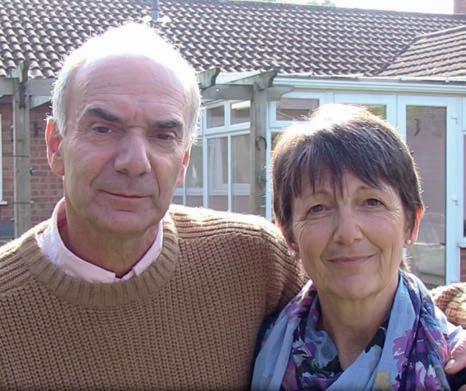

Having bene ted from buying their home during the 80s boom, Martin & Susan looked to their good fortune in property to boost their retirement dreams and help their daughter when she needed it most.
While pensions have been through a torrid time and radical regulatory change, the equity built up in homes across the UK has been growing at a rapid pace.
Modern, regulated Lifetime Mortgages make it possible to tap into this wealth with no loss of home ownership and no monthly repayments required.
is is a Lifetime Mortgage and will reduce the value of an estate and can a ect your entitlement to means-tested State Bene ts. To understand the features and risks, ask for a Personalised Illustration. e Reader’s Digest Equity Release Service is provided by Retiredom, which is a trading style of Responsible Life Limited. Only if you chose to proceed and your case completes will Responsible Life Limited charge a fee for advice, currently £1,295. Names changed to protect identity. Request a
PARTNERSHIP PROMOTION
MONEY
free guide to Lifetime Mortgages by calling 0808 168 9297
STORY COMPETITION 100 Word
Entries are still pouring in for our annual short-story competition. Be inspired by these tales and get writing!
Terms and conditions
■ There are three categories—one for adults and two categories for schools: one for children aged 12–18 and one for children under 12.
■ In the adult category, the winner will receive £2,000, and two runnersup will each receive £200.
■ In the 12–18s category, the winner will receive a Samsung Galaxy Tab S2 (8.0, WiFi) and a Samsung Gear 5 watch, plus £150 for their school. Two runners-up will each receive £100.
■ In the under-12s category, the winner will receive a Samsung Galaxy Tab S2 (8.0, WiFi), plus £100 for their school. Two runners-up will each receive £75.
■ Your stories should be original, unpublished and exactly 100 words long. Please submit them online at readersdigest.co.uk/100-wordstory-competition by February 20.
■ The editorial team will then pick a shortlist of three in each category and post them online on March 6. You can vote for your favourite, and the one with the most votes will scoop the top prize. Voting will close on March 27 and winning entries will be published in our June issue.




























■ The entry forms are on our website, along with details of the prizes.


Would you like help to write your own autobiography? Turn the page for details.
Q W E R T Y U I OP A S DF GH J KL ZX C V B N M
INSPIRE
| 01•2016 64
Fiona Gibson
Our twin daughters are leaving home. “You’ll be devastated,” my friend Sarah remarks. “To go from the four of you to just to you two…”
“I know,” I reply, glancing at my husband Jim.
“It’ll be horribly quiet,” she adds. “You’ll wonder what to do with yourselves…”
She’s right, of course: for 19 years our lives have revolved around our girls. The final week passes, music blaring from their bedrooms, spilt breakfast cereal left in their wake. They leave, and I open the fridge to discover chilled champagne. We find each other again, happily and gratefully, after all these years.
 ■ Fiona Gibson’s The Woman Who Upped & Left is released in digital format and paperback next month.
■ Fiona Gibson’s The Woman Who Upped & Left is released in digital format and paperback next month.
Stuart Evers
Henry Stimson is thinking of his honeymoon. The low-lying sun over the Kamo River; pale stucco pagodas, their interiors cool and silent; cyclists, shaded by parasols, weaving alongside an electric railway. He and Mabel ate the finest meal of their lives there, just after watching a baseball game. It was, he thinks, the most perfect time of his life.
“We’re going to need a decision, Mr War Secretary,” the General says.
Stimson thinks of his wife under mosquito nets, her face so close to his.
“Not Kyoto,” he says. “Somewhere else.”
“Nagasaki?” the General says.
“Yes,” Stimson says. “Yes. Nagasaki.”

■ Stuart Evers’ Your Father Sends His Love is out now, available to purchase from the Reader’s Digest shop.
Rules: Please ensure that submissions are original, not previously published and 100 words long (not including the title). Don’t forget to include your full name, address, email and daytime phone number when filling in the form. We may use entries in all print and electronic media. Contributions become world copyright of Reader’s Digest.
Entry is open only to residents of the UK, Channel Islands, Isle of Man and Republic of Ireland. It is not open to employees of Vivat Direct Ltd (t/a Reader’s Digest), its subsidiary companies and all others associated with this competition, their immediate families and relatives living in an employee’s household. The judges’ decision is final.
01•2016 | 65



A Resolution
I Will Keep
Never mind that diet you won’t obey—make your New Year’s resolution to write your life story for your family and loved ones
HOW MANY TIMES HAVE YOU BEEN TOLD YOU SHOULD WRITE A BOOK?
How many times have you been asked to write your life story, to record your memories? Have you ever been bought a notebook with headings to write things into, or been given a recording device to record your thoughts and memories? Did you ever use them or, like most of us, are they lying in a drawer somewhere gathering dust?
Have you ever said to yourself, I must write my life story? Did you start and get stuck? Unless you’re a natural author, it’s really hard to sit down and start writing down your memories,
100-WORD-STORY COMPETITION
| 01•2016 66
thoughts and especially feelings. It can be so hard to not just write the facts—the sentiments and feelings that are difficult to put on paper are what really give future generations an idea of what life was like in your day. To explain that you too have loved, had highs and lows and to recall how you dealt with them. To explain your values and to record some history from your parents and grandparents before it’s lost forever.
LIFEBOOK HAS HELPED hundreds of authors aged 42 to 102 in 15 different countries write their books, and is the world’s leading autobiography service. Started by Roy Moëd just four years ago, LifeBook has trained interviewers who regularly visit “authors”, making the project fun and enjoyable. Ghostwriters will then professionally write the stories, while maintaining the author’s “voice”.


Have you regretted not having a loved one’s stories and thoughts, now that it’s too late? Don’t make the same mistake for your family. Make your 2016 resolution to write your LifeBook and have a project you’ll enjoy.
No one has ever regretted “doing a LifeBook”; many wished they had.
Now it’s your turn to have a legacy and to make a resolution you can keep. To discover more about how LifeBook can make your 2016 resolution come true, how keeping to this resolution will be a real fun project this winter and how your family will be delighted, call one of our LifeBook team on 0800 999 2280 or email us at digest@lifebookuk.com
READER’S DIGEST
01•2016 | 67

Best Of British
Bookshops
Calling all bibliophiles! Whether you’re a fan of novels, a non-fiction nut or a poetry aficionado, browse away an afternoon in these treasure troves
BY FIONA HICKS
68 INSPIRE



Mr B’s Reading Emporium BATH
A huge part of the charm of this place is Mr B (or Bottomly) himself —a former derivatives trader who gave it all up in 2006 to indulge and share his passion for the written word. He’s regularly in the shop and his enthusiasm must be contagious because his staff are all similarly
chirpy, frequently hand-writing recommendations to lend a personal note to the brimming shelves.
“We make a real effort to give the shop a proper community feeling,” says one employee. “You can drop into the shop any time for a chat, and we pride ourselves on championing lesser-known titles.”
Don’t forget to visit the Reading Booth during your visit. For a paltry few pounds, you can wile away an afternoon in a comfy chair with a steady supply of coffee and biscuits.
■ Visit mrbsemporium.com for details
| 01•2016 70 BEST OF BRITISH PREVIOUS IMAGE: © EKAPHON MANEECHOT/SHUTTERSTOCK
The Book Hive
NORWICH
Stephen Fry said this shop is “the kind of place I dreamed of existing in Norwich when I was growing up”. As well as being a favourite of celebrities, this is a front-runner for the nation’s prettiest bookshop, with an expansive glass shopfront, colourful art adorning the walls and gold letters studded on the ceiling.

The three storeys are home to thousands of hand-selected titles, with an especially impressive artand-design collection.
Proprietor Henry Layte says, “The Book Hive is like a proper oldfashioned bookshop, but it’s also contemporary, stylish and fun—like going to someone’s house with great taste, where everything is for sale!”
It’s the sort of place where you wander in to find one book and leave carrying ten others. You have been warned…
■ Visit thebookhive.co.uk for details

READER’S DIGEST 01•2016 | 71
Word on the Water LONDON
This quirky canal boat is primarily moored near Paddington Station, but has been known to take jaunts up and down the Thames. Founded in 2011 by Paddy “The Doctor” Screech and his friend John “The Professor” Privett, it roused the support of locals —along with Booker Prize winner Ben Okri—to win a permanent spot on the busy river.
Being a nautical bookshop, it’s obviously not enormous, but it’s brilliantly stocked. New and old titles abound, and thanks to donations from supporters, costs are kept down—meaning you can pick up a paperback for a mere £3. It’s an especially cosy place to visit in winter, with mulled wine on offer and warm greetings from Paddy’s two cats, Nanny and Brubby.
■ Visit facebook.com/wordon thewater for details


Barter Books NORTHUMBERLAND
You’ll never have the problem of nothing to read on the train when travelling through Alnwick. Under the metal beams of the Victorian Station lie the free-standing bookshelves, homely rugs and open fires that make up Barter Books.
It’s a wonderland for both adults and kids: in addition to the thousands of second-hand titles, there are more than 40 glass cases housing rare books, along with a children’s room filled with toys.
Many a visitor can also be seen
BEST OF BRITISH | 01•2016 72


gawping at the Writers Mural—a vibrant depiction of life-size literary figures painted high up on the wall. See if you can spot Charlotte Brontë, F Scott Fitzgerald and the inimitable Charles Dickens.
What’s more, with The Station Cafe just a few steps away, you can enjoy a slice of cake to fuel your browsing!
■ Visit barterbooks.co.uk for details
The Poetry Bookshop BRECONSHIRE
Poetry bookshops are few and far between—especially ones that are located in a former ice house. This brick-lined subterranean chamber houses the most comprehensive collection of poetry in the country. Antiquarian, contemporary, scholarly…all bases are covered, and if you can’t find something you like, the expert staff will happily track down a volume.
Hay-on-Wye is especially bustling during the summer months (when the world’s literati descend on the Welsh town for the annual literary festival), but it’s a sterling destination for book lovers and the lyrically minded any time of the year. After reading a few verses in the Ice House, there are upwards of 30 other bookshops awaiting perusal.
■ Visit poetrybookshop.co.uk for details

READER’S DIGEST 01•2016 | 73
Octavia’s Bookshop
GLOUCESTERSHIRE
This is a pure confection of a shop, designed to catch the eye of any passing child and lure them into the wonderful world of reading.
“I set up Octavia’s Bookshop due to my passion for children’s literature,” says owner Octavia Karavia (pictured below). “We offer a magical shopping experience for the whole family.”
Octavia and her team certainly do have the magic touch: since opening in 2011, the shop has won a plethora
of awards, most notably the Best Children’s Independent Bookshop in The Bookseller Industry Awards.
But it’s not just the books that keep the little patrons coming back— it’s the lovely sense of community that Octavia creates. Book groups (for various ages up to teenagers) can barely contain the number of eager participants, and the regular events bring literature to life with readings and immersive activities.
■ Visit octaviasbookshop.co.uk for details

| 01•2016 74 BEST OF BRITISH

Much More Books
SHROPSHIRE
Nestled in the high street of the market town Much Wenlock, Much More Books is the epitome of an antiquarian shop. Historic premises, an eclectic and well-thumbed collection, and even a book-finder service (for those without the web) combine to make you feel as if you’ve stepped back a few decades.
Every genre is covered, with a good dose of local-interest titles thrown in. You can even add to your music collection with their impressive selection of vinyls and CDs. Owner

All
■ Visit muchmorebooks.co.uk for details
Do you have a favourite bookshop?
Email readersletters@readersdigest. co.uk and let us know
01•2016 | 75 READER’S DIGEST
Liz Challinor proudly says, “We’re a haven for all book and music fans. Once discovered never forgotten!”
the staff here are, by their own admission, “bonkers” about books.
Alastair Fothergill is the award-winning producer and director of numerous nature documentaries, including the recent BBC series The Hunt, Frozen Planet, Planet Earth and The Blue Planet. He’s the author of five books.
If I Ruled the World Alastair Fothergill
I’d stop global warming. This is the biggest threat to humanity, and anyone who tells you otherwise doesn’t understand the gravity of the situation. I’ve seen the effects with my own eyes, most vividly at the Poles where it’s happening very fast. Yet the solutions are all within the capability of mankind. We must drastically cut our use of fossil fuel. No one needs a petroleum car these days—we can generate all the power we need with nuclear energy. We should change our diet so there are fewer cows and sheep producing methane gas. All of this is possible; it’s the politics that are difficult.
Every country would set aside at least ten per cent of their land surface for national parks. That’s a conservative figure, but it would give much-needed protection to our planet. Where national parks are in place I’d insist that the profits benefit the community, rather than tour companies or governments that



INSPIRE | 01•2016 76
illustr A ted B y J A mes s mit H
pocket the profits for their own use. Eco tourism can only work if the local people can see the economic advantages of conservation. I’d also make sure that every country with a coastline has marine sanctuaries— a preserved area where no destructive activity is allowed.
I’d abolish food waste. We throw away 50 per cent of our food in the Western world, and that’s an utter crime. I’d put more schemes in place to make use of unwanted food and tax the supermarkets heavily on anything they throw away. We also need to change people’s mindset; we’ve got used to overly packaged food and have lost touch with the joys of eating seasonal local produce. I used to love the excitement of the first strawberries in summer and how good they tasted.
We’d take five weeks holiday a year. In America, I work with executives who never take any. Yet when you look at the happiest countries, they are the ones where people take the most paid holiday. For me, it’s about spending time away from the constant white noise of communication. I’d like to say I turn my screens off when I go away, but it’s not always easy.
I’d insist every child spends quality time in the countryside as part of their education. Children must be given the chance to understand the different values between the town and
the country. You can’t expect people to care about country issues if they have no experience of life there.
I wouldn’t allow the swallow or barn owl to become extinct. The swallow is a harbinger of summer, and with it comes at least the hope of some beautiful months ahead; my favourite day of the year is in April, when the first ones appear back in the UK. I still find it a miracle that a bird, with a brain smaller than my little finger, can fly from South Africa across the Sahara and return to within one yard of where it was hatched.
The barn owls aren’t doing so well as their habitats, old barns and rough grassland, are being destroyed. It was the barn owl that brought my wife and me together when I filmed them in Somerset. I’d persuade her to sit with me in the little hut where we’d look at the footage. It wasn’t until recently that she confessed she’d never actually seen the real owls as she’s very short-sighted—she’d just pretended to make me happy.
I’d remind people to count their blessings. I’m very fortunate to work with people in proximity to nature. I believe we’re nicer for it and I have great faith in humanity. As told to Caroline Hutton
The Hunt by Alastair Fothergill and Huw Cordey is published by BBC Books and out now.
01•2016 | 77
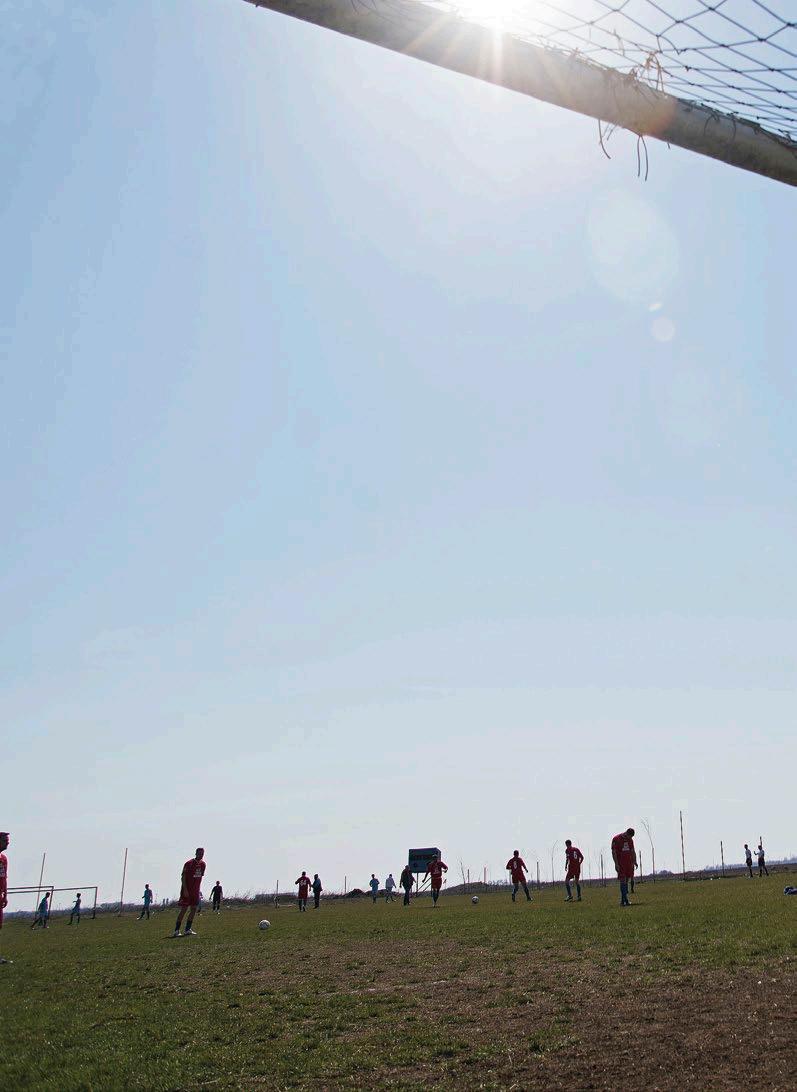
FIELD OF DREAMS
On bare, bumpy turf in the city of Bucharest, they built football’s unlikeliest team
BY ANA-MARIA CIOBANU
78
INSPIRE
 Goalie Tudorel Mihailescu directs his team at a match on their home ground
Goalie Tudorel Mihailescu directs his team at a match on their home ground
N THE GRASS between an overgrown field and a football stadium on the outskirts of Bucharest, 14 men in red shorts and red T-shirts, most of them in their thirties and forties, some with pot bellies and receding hairlines, rotate their heads and hips and shake their ankles and shins.
“Come on, move!” shouts the player running the warm-up session. “On my cue, ankle pumps. You make a mistake, you do push-ups!”
The men make fun of each other, enjoying the sunny spring Saturday. The somewhat motley team is happy. It’s a good feeling to be on their home field again, playing football, the game they love. Their owner Constantin Zamfir is on the sidelines, readying the barbecue for the post-match festivities.
Of the 50 players enrolled at Fra˘t‚ ia— the name means brotherhood—some are former footballers, others played as children and went back to their old hobby. They all found a home at Fra˘t‚ia, where no one cares if you’re a wellknown flute player in the Bucharest Symphonic Orchestra, like midfielder Ca˘ta˘lin Oprit‚oiu, or a Roma day worker such as striker Marin Florian.
A father of two, 36-year-old Marin helps the team owner with everything he can—levelling the field, painting, cleaning the locker rooms, planting grass seed and washing the sports equipment. In return, his colleagues give him used football cleats and shin guards and presents for his daughters. What matters is team spirit and love of the game.
Two of Fra˘t ‚ ia’s three teams are in Romania’s fourth league (the third is in the senior league) and today, ASF Fra˘t ‚ ia is preparing for its first home game in the fourth-league championship. It’s been a long uphill battle for the team, and for Constantin Zamfir.
ROMANIANS ARE FOOTBALL CRAZY, with more than 120,000 professional players and even more amateurs across the country.
Constantin Zamfir is no exception. As a child, he commuted from his parents’ village to Bucharest to be a striker for a third-league team. In the 1990s he became the coach-player of Vulcanul Bucurest ‚ i, a fourth-league team owned by the Vulcanul plant, a large manufacturer of industrial tanks.
| 01•2016 80 FIELD OF DREAMS
O
ALL PHOTOS BY MIRCEA RESTEA
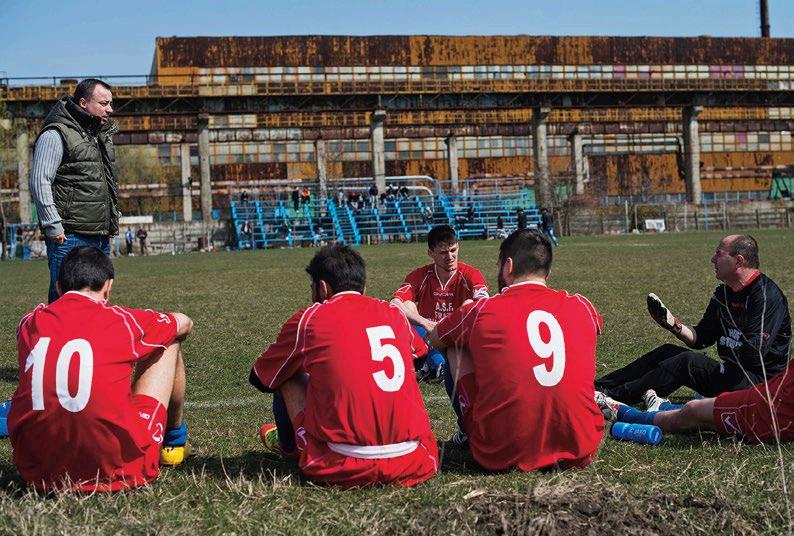
But after the fall of communism in 1989, the plant was privatised and the football team was disbanded in 2001. It was then that Constantin decided to make a dream come true: he would start his own team. He sold his family home, moved with his son and wife into his in-laws’, and used the money to buy the Vulcanul sports field.
He named the team Fra˘t ‚ ia Bucurest‚i, in memory of his parents—simple peasants who had taught their four children always to share what they had. He wanted Fra˘t‚ia to prove that by “being brothers, you can succeed” and that “sharing the bread is the only way of being a family”.
But following through on his dream wasn’t easy, or inexpensive. Within two years, he found himself in debt. The plant that powered the stadium made him, as owner, pay for the utilities—an expense he couldn’t afford—so the power and water supplies were cut off. He had to take a bank loan for £650 to have a well dug.
Everything Constantin earned, he poured back into the stadium. When he ran out of money, he borrowed. Even though he struggled day and night to pay his loans, working as a taxi driver and wedding singer, he never thought of quitting his dream. He welcomed all players, no matter
01•2016 | 81
Daniel Boruga (standing, left) coaches the teams along with goalie Tudorel (far right)
their age, race or ethnicity. Without actually planning it, he ended up owning one of the most diverse teams in the fourth league’s history, uniting Roma players, Congo nationals, young men from nearby orphanages and aspiring teenagers (including his son). And a one-armed goalkeeper.
At 49, Tudorel Mihailescu’s road to Fra˘t ‚ ia hadn’t been easy. He was born with a malformation in his left arm,
matches and wrote an article in The New York Times about the diversity of the players and the family atmosphere the owner had created around the team, including raising chickens and goats near the field.
When the team was subsequently featured in the local media, the field and locker rooms were looted. Vandals stole the generator, the lawn mower, the wire fence, two Rottweiler pups,
I NEED TO KNOW WHO WANTS TO STILL BE A PART OF THIS TEAM, AND WHO WANTS TO GO THEIR SEPARATE WAY. NO HARD FEELINGS
which had to be amputated below the elbow. From the age of ten, Tudorel begged sports doctors to give him medical clearance to play with one hand. But in communist Romania, people with disabilities were supposed to be hidden from the public. Finally, at 14, he was given permission to play on an official team. In 2013, he and Zamfir crossed paths in the senior championship. They not only had their love of football in common, but both believed they could achieve whatever they set their minds to.
EVERYTHING SEEMED to be coming together for the team when it ran into more problems. In April 2014, a British journalist attended one of Fra˘t‚ ia’s
the chickens and the goats, and killed a stray dog that guarded the field.
Constantin was devastated but determined to carry on. Fra˘t ‚ ia started the autumn championship with no hot water or electricity, and as it got colder it became harder for the players to shower with water from the well. After the first snow, they had to train on rented fields to stay in shape.
Then early last year, just as the club was getting back on its feet, the Bucharest City Football Association told Constantin they wouldn’t be allowed to play official matches on their home field unless there was a wire fence around the pitch and electricity and hot water for the locker rooms.
Constantin was tired and had other
| 01•2016 82 FIELD OF DREAMS
I W

The always-anticipated post-game feast with team owner— Constantin Zamfir, in blue—manning the barbecue
things on his mind: his son, who he hoped would follow his footsteps and keep Fra˘t‚ ia going, had serious heart problems and the family’s money was now reserved for medical care.
But Constantin wanted the team to have one more chance to survive. He rented an indoor field and called a meeting in January. More than 20 men gathered around him in a locker room, eager to start playing again. As he looked everyone in the eye and started his speech, Constantin was nervous and his cheeks turned red.
“As you know, I gave everything to football and I will continue to do this,” he said. “My boy collapsed on the
field because of his heart problems. Last summer’s looting cost us £2,500. I didn’t ask for anything, but luck shone and a gentleman called me and offered to donate a generator.
“I need to know for sure who’s still part of this team and who wants to go in separate ways. No hard feelings.”
“That’s why we’re here,” said Marin. “We want to be part of this team.”
Constantin was both pleased and relieved. He explained that in order to keep the team alive and be able to play official matches, each player would have to pay 55 euros—this would go to paying referees and official observers and also carrying out repairs.
01•2016 | 83

All the players who came to the January meeting rallied to help keep the organisation together and meet the Football Association’s criteria. Tudorel, along with Ca˘ta˘lin, scheduled practices, called players to remind them of the tax and made loans to those who didn’t have the money.
During this time, Constantin practised along with the team on rented synthetic fields. On the pitch, he was able to forget about his problems. At 51, he’s still fit and competitive—he grew up on the pitch and it’s here that he feels truly alive.
Slowly, it started to come together. With the help of Marin, Constantin
repainted the pitch lines, trimmed the trees on the sidelines, patched up the fence and painted the locker rooms.
Finally, just a few weeks before the start of the spring championship, the association re-authorised their field, referees and observers had been paid, and the team was able to enter the fourth-league competition.
BUT THEIR FIRST OFFICIAL GAME
doesn’t go well. After a 4-0 defeat, the players huddle on the sidelines. They want to learn something from the experience and stay together.
“We know this is the best we can do right now.”
“Overall, it was OK.”
“We’ll get them next time!”
Throughout the game, Constantin has been getting the generator going for the showers, putting juice and beer cans into plastic barrels filled with cold water to chill, and lighting the barbecue for the post-game feast.
As far as he’s concerned, it’s not about winning but doing your best, especially for the older players.
With the players showered and changed, and the pitch smelling of well-grilled minced-meat rolls, Constantin tears the bread in equal parts and hands it out to his players with the meat rolls smeared with mustard and salt. Everyone is in good humour again, and when the owner starts improvising a song about the team, the players join in.
The brotherhood carries on.
| 01•2016 84
Tudorel warming up before a game













Adventures Queensland In
TRAVEL & ADVENTURE
86

Whether it was snorkelling with turtles, cruising along beaches or sampling seafood, Lynne Wallis discovered the holiday of a lifetime in north-east Australia
I’D BEEN IN MOOLOOLABA ON AUSTRALIA’S SUNSHINE COAST FOR UNDER AN HOUR when I knew for certain that my list of favourite places in the world needed a rejig.
I was enjoying outside jacuzzi bubbles at the luxurious Oceans Apartments, facing the dazzling azure sea. The pool was overlooked by vast sub-tropical trees. A tiny green bird was swooping down and skimming over the surface of the pool, chirruping with delight, daring to go closer and closer to the water each time. Its mate soon flew down and joined the fun. The sun shone down on the scene as parakeets flitted noisily in the trees overhead. I was mesmerised.
The 4,350-mile-long Sunshine Coast is in Queensland, north of Brisbane on the eastern side of Australia and home to the Great Barrier Reef. Mooloolaba—the emphasis is on the loo—is a supremely laid-back seaside town where friendliness and top-notch service are the order of the day. The Spice Bar restaurant serves some of the finest Asian seafood I’ve ever tasted, and the $9 avocado-on-toast brekkie—Australians abbreviate everything —at the Lot 404 beachside cafe is unmissable. For a couple of dollars more, you can even “build your own brekkie”.
I LOST MY HEART TO AN AFRICAN GREY CALLED ANGEL. HER CLAWS GAVE ME A HEAD MASSAGE I’LL NEVER FORGET
that’s very like a crying baby. The Maleny Botanical Gardens are worth a visit, even if just to see Australia’s only “free-flight” aviary. Giant macaws and a host of other breeds land on visitors’ arms and heads the moment they enter—I lost my heart in seconds to an adorable African Grey called Angel; her claws gave me a head massage I’ll never forget.
Hinterland was our next port of call, 18 acres of rainforest where wallabies are regularly spotted and cat birds make an alarming sound
Lunch in the nearby foodie-heaven village of Montville was followed by a milelong stroll through the rainforest, known as the Wompoo Walk after the sound the local pigeon makes. Guided walks, or bush-tucker trials, are available for those keen to learn about the trees and plants, and the foods and medicines made from them. The
| 01•2016 ADVENTURES IN QUEENSLAND 88
I
PREVIOUS IMAGE: © STEFFEN BINKE/ALAMY STOCK PHOTO

Piccabeen palm, which only grow around creeks and other wet sites, can reach a staggering height of 145 feet. If you’re lucky, you may catch a glimpse of a possum or even a wallaby.
Tea Tree Bay, a surfer’s paradise, is one of many beaches in Noosa
you’re desperate to see a koala bear, this is your place—they’re well hidden in the gum trees, but their distinctive brown-grey fur gives them away if you look closely.
We headed up to what some of us called Hampstead-on-Sea—the chic, affluent town of Noosa, which boasts some rather upmarket restaurants lining its beachfront. It’s worth getting up at dawn to see the sunrise on Main Beach and maybe even enjoy a dip. You’ll almost certainly see a few shaggy bush turkeys strutting about in the bushes behind the sand.
Tea Tree Bay is a picturesque headland in Noosa’s National Park, a favourite location for surfers. If
BUT THE SCALE OF THE COUNTRY was summed up for me by the Great Beach Drive, a 125-mile-long trip that took us two hours. I hadn’t realised that this meant driving on the actual beach, shooting past other vehicles on the vast expanse of sand, but we got used to it after a few miles.
Every so often we passed families camping. Visitors have to bring chemical loos, as there are heavy fines for anyone caught burying human waste. And keep an eye out for other
01•2016 | 89
© ALL OTHER PHOTOS FROM TOURISM AND EVENTS QUEENSLAND


ANY FEARS I HAD OF SHARKS DISAPPEARED AS THE SHEER BEAUTY OF THE UNDERWATER WORLD ENVELOPED ME
vehicles as you walk around—the drive is considered a road, and police patrol it as such for speeding and drink driving.
Our driver Glen from Surf and Sand Safaris, one of the oldest four-wheeldrive safari outfits in the region, took
| 01•2016 90 ADVENTURES IN QUEENSLAND
A bird’s-eye view of Lady Elliot Island; (below) Noosa National Park; (right) Mooloolaba, a great seafood destination
us to see the coloured sands at the aptly named Rainbow Beach before driving us up to the Double Island Point Lighthouse, named by Captain Cook. The views were sublime.
IT WAS TIME TO HEAD OUT to Hervey Bay Airport to catch our 12-seater plane and fly out to Lady Elliot Island at the southern tip of the Great Barrier Reef. The coral island is a World Heritage Site and is regarded as one of the best places on the reef for snorkelling and diving. You can swim and snorkel around the island alone and see a lot of marine life, or take a boat trip and be dropped into the ocean within ten minutes.
They say the island has to be experienced three ways—from the air, the land and the sea. But it was the latter that I’ll never forget. The instant you’re immersed, you’re in another world. My wildest reef dreams came true when a turtle came right up to me and nuzzled me for a scratch as shoals of yellow and turquoise fish darted past. Any fears I had of sharks disappeared as the sheer beauty of the underwater
world enveloped me. I’d never seen anything like it in my life.
The island is also a twitcher’s delight—with 200,000 birds living here, it was once mined for its bird poo, used to fertilise agricultural crops. Accommodation is basic, but it’s all part of the experience. Nothing else matters here but the astounding scenery and the knowledge that another underwater world is living and thriving all around you.

OUR FINAL DESTINATION was the largest sand island in the world, Fraser Island. Seventy-five miles long and ten wide, it’s one of two places on earth where commercial planes can take off and land on sand (the other is Burrough in Scotland). It’s also home to Australia’s purest strain of dingo and 14 venomous snakes and spiders.
Fraser’s tour guides are passionate
01•2016 | 91
READER’S DIGEST

about the natural world—many have degrees in biology and are very well informed about the island and its history. My highlight was a beach trip on segways one morning and seeing millions of tiny blue soldier crabs heading for the ocean. Their daily march down to the water for food is done with military precision and determination. At the other end of the size scale, around 16,000 humpback whales migrate to the region to breed, each one the equivalent in size to nine African elephants.
Our trip was over. On the way home, I made the decision to put
The Maleny Botanical Gardens in Hinterland; (below): a sleepy koala bear enjoys a snooze

Australia at the top of my favourite destination list, even though I’d only seen one tiny part of it. But I had a feeling that even if I’d been to other parts of this awesome country, Queensland would always hold a special place in my heart.
DASHBOARD APOLOGY
They say it’s the thought that counts—unless you’re left with this note and a damaged car.
“Hi. My name is ‘Jim’. I accidentally hit your car and someone saw me so I’m pretending to write down my details. SORRY. Jim.”
SOURCE: FACEBOOK.COM
| 01•2016 92

Win a 4K Smart TV!


Reader’s Digest is giving away a 4K Panasonic Smart TV!


There is no reason to stick with an old, unreliable broadband service when it’s now easier than ever to make the switch to a better deal. But with so many amazing offers now available, it can be difficult to pick the perfect one for your home. That’s why it’s always better to talk to an expert in the know first.

The Reader’s Digest Digital Switching service offers exactly that. All it takes is one free and noobligation phone call to us and our friendly experts will talk you through the whole process.
For a chance to win this TV competition, simply enter your details below for a callback, or call us on 0800 977 6605 Alternatively, you can visit www.readersdigest.co.uk/tvcompetition.

Best of luck!







All fields are mandatory to qualify for the competition
First name: _____________________________
Last name: _____________________________
Age: _______________ Gender: ________________ Country**: _________________________
Phone number*: ______________________Email address: _____________________________
Current broadband, home phone or TV supplier: ____________________________________
o I agree to receive offers for products and services from selected partners
o Yes please, sign me up for the Reader's Digest newsletter
If you are sending your entry by post, make sure it reaches us by the 24 January 2016: TV Competition, 4th Floor, Highlight House, 57 Margaret Street, London, W1W 8SJ.
The competition ends at 12 PM on 25 January 2016
*By entering your phone number, you agree for Reader’s Digest Digital Switching service to call you back and help you save on your broadband, home phone and TV service.
** The competition is open only to residents of the UK and there is no cash alternative. Full terms and conditions are available on the website.


Greenway, the Queen of Crime’s holiday retreat; (below) the boathouse
BY CATHERINE COLE
My Great Escape: Lovely Greenway
Julie Hall from Gloucestershire went back in time to Agatha Christie’s home in Devon

Catherine has danced in Rio, been microlighting in South Africa and hiked the mountains of Oman


WHILE STAYING AT THE GRAND HOTEL in Torquay last year—where Agatha Christie spent part of her honeymoon —I seized the opportunity to visit a place I’d long wanted to see: Christie’s beloved holiday home, Greenway. It was a train ride to Paignton, then a steam-train ride along the “English Riviera”. Walking slowly up Greenway’s path, my excitement began to build, along with my nerves. Could Greenway really live up to my expectations?
I needn’t have worried: as I turned the corner onto the driveway I stopped at the sight of a dazzlingly white Georgian house, flanked by scarlet azaleas. It’s a sight seen many times during the television adaptations of the Poirot novels, and I wouldn’t have been surprised to see Poirot, Captain Hastings or Ariadne Oliver emerge onto the porch. Inside, it’s easy to believe that it’s still the 1950s and Agatha is merely on the lawn playing croquet. Everything has been left as it was, with the family’s great collections— artefacts, books, silver photo frames—on view in every room. Agatha had known the house as a child, referring to it as “the loveliest place in the world”.
| 01•2016 94 TRAVEL & ADVENTURE
© NATIONAL TRUST IMAGES/NICK GUTTRIDGE / © NATIONAL TRUST IMAGES/JAMES DOBSON
No visit to Greenway would be complete without seeing the famous boathouse—the scene of the crime in her novel Dead Man’s Folly. There’s a palpable feeling of calm mystery oozing out of its brickwork, with views over the River Dart.
Afterwards, I sat on a bench on the porch and drank in the sunshine, the riot of colour in the flowerbeds and the tantalising glimpses of the river through the trees. I completely understood the hold that Greenway had on its famous owner. Only the thought of the steam-train journey back made it possible to leave.
■ ALL ABOUT AGATHA
Visit nationaltrust.org.uk/greenway for opening times and full details.

WE WANT TO HEAR FROM YOU!
Postcard From... Andalusia

THIS TIME OF THE YEAR in
Andalusia, you’ll find the locals waiting in earnest for the almond trees to blossom with trademark pink, white and mauve petals. Almond blossom here has long been compared to the Japanese cherry blossom season, although many argue that the European version is far more beautiful. It’s certainly quieter than its Eastern cousin and easily accessible: drive through Andalusian countryside just outside of Malaga to spot it.
■ CONTINENTAL PETALS
Spain-Holiday offers trips from £94pp (020 3384 7066; spain-holiday.com).
Tell us about your favourite holiday (send a photo too) and if we include it on this page we’ll pay you £50. Go to readersdigest.co.uk/contact-us
01•2016 | 95
Things To Do This Month

BELGRADE IN TWO MINUTES
■ DO: BELATED CHRISTMAS
Serbia still follows the old Julian calendar, which means Christmas starts on New Year’s Eve and carries on until mid-January. Enjoy the relaxed, festive atmosphere a month after everybody else (serbia.travel).
■ SLEEP: SQUARE 9 BELGRADE
Designed by Brazilian architect Isay Weinfeld, this Leading Hotels of the World property is a crash course in mixing modern design and a historic city. Be sure to have a drink in the cosy Lobby Bar (+381 (0)11 3333 500; squarenine.rs).
■ WALK: SKADARLIJA
Belgrade’s bohemian quarter is all local restaurants, buskers and cobbled streets. Like Montmatre in Paris, Skadarlija remains madly busy all day, so hole up in a pavement cafe with a blanket to people-watch.
SHORT/ LONG HAUL: YOGA HOLIDAYS
LONG: The popular Soul & Surf guesthouse, which started several years ago in Kerala, southern India, has just opened its doors in Sri Lanka. Come for relaxed surfing and morning yoga sessions. Soul & Surf offers seven nights from £775pp (01273 931 282; soulandsurf.com).

SHORT: There aren’t many places more relaxing than the south of France, and new in 2016 is in:spa’s yoga retreat at Puyssentut, a chateau just outside of Toulouse. A sevennight retreat starts from £1,995pp (020 3235 0120; inspa.co.uk).

TRAVEL APP OF THE MONTH
Hello Gbye, still in test mode. Activated by voice command, this app allows you simply to talk about your upcoming holiday, turning words into real, bookable travel plans.

| 01•2016 96 TRAVEL & ADVENTURE
FOR MORE, GO TO READERSDIGEST.CO.UK/TRAVEL-ADVENTURE © RADIOKAFKA/SHUTTERSTOCK








WIN YOUR 2016 SUMMER HOLIDAY Thank You for choosing us as the “Best Island in the British Isles” Find out what real visitors say about Jersey: jersey.com/summer Follow us on
All Or Nothing
With so much at stake, both students and teachers feel the pressure at China’s “cram schools”
BY BROOK LARMER
THE MAIN STREET OF MAOTANCHANG, a secluded town in eastern China’s Anhui province, was nearly deserted on a Sunday morning in spring. A man dozed on a motorised rickshaw, while two old women with hoes shuffled towards the rice paddies outside town. Then, at 11.45am, the stillness was shattered. Thousands of teenagers swarmed out of Maotanchang High School. It was lunchtime at one of China’s most secretive “cram schools”— a memorisation factory where 20,000 students train for China’s national college-entrance examination, known as the gaokao.
98

 Xu Peng, 19, the superstar student who made it into the elite Tsinghua University
Xu Peng, 19, the superstar student who made it into the elite Tsinghua University
THE GRUELLING TEST, administered every June over two or three days (depending on the province), is the lone criterion for university admission in China. For the students at Maotanchang, most of whom come from rural areas, it offers the promise of a life beyond the fields and the factories.
Yang Wei, a peach farmer’s son, had spent the previous three years, weekends included, stumbling to his first class at 6.20 in the morning and returning to his room at 10.50 at night. Now, with the gaokao just 69 days away, Yang had entered the final stretch.
“If you connected all the practice tests I’ve taken over the past three years,” he told me with a bitter laugh, “they’d wrap all the way around the world.”
factory job to support him in his final year of cramming. Cao’s mother came to live with her son as well. “It’s a lot of pressure,” said Cao, whose family paid more in school fees than Yang’s family —about £1,300 a term—because of his low marks entering high school. “My mother constantly reminds me that I have to study hard, because my father is out working construction far from home to pay my school fees.”
MAOTANCHANG PRIDES ITSELF ON ELIMINATING THE
DISTRACTIONS OF MODERN LIFE
Even with all the relentless practice, Yang’s scores were slipping, a fact that clouded over the lunch I ate in the single room that he and his mother shared. We were joined by Yang’s father, visiting for the afternoon, and his closest friend from his home village, a classmate named Cao Yingsheng. The room’s high rent, rivalling rates in downtown Beijing, represented only part of the sacrifice Yang’s parents made to help him— their only son—become the first family member to attend university.
Yang’s mother Lin Jiamin quit her
EACH YEAR, more than nine million students take the gaokao. There are two versions: one focused on science, one on humanities. The pressure to start memorising and regurgitating facts weighs on Chinese students from the moment they enter primary school. “To be honest,” one of my Chinese friends, a new mother, told me, “the gaokao race really begins at birth.”
Even as the gaokao produces some of the world’s most scarily proficient test-takers, it’s coming under fire in China as an anachronism that stifles innovative thought and puts excessive pressure on students. Two years ago, a student posted a shocking photograph online: a public high-school classroom full of students hunched over books, all hooked up to intravenous drips to give them the strength to keep studying.
| 01•2016 ALL OR NOTHING 100
PHOTOS BY
ALL
SIM CHI YIN/VII
Yang Wei’s grandfather looks after the 20-yearold so he can study for at least 16 hours a day

Beijing is now pushing reforms to reduce student workloads, expand the curriculum beyond core courses and allow universities to consider factors other than gaokao scores. “China is caught in a prisoner’s dilemma,” says Yong Zhao, a professor of education at the University of Oregon. “Nobody is willing to break away, because the gaokao is still the only path to heaven.”
ISOLATED
IN THE FOOTHILLS of Anhui, Maotanchang prides itself on eliminating the distractions of modern life. Mobiles and laptops are forbidden; the dorms—where roughly half the students live—were designed without electrical outlets. Romance is banned.
In town, where the rest of the students live—mostly with their mothers in tiny partitioned rooms—the local government has shut down all entertainment. This may be the only town in China with no video arcade, billiards hall or internet cafe. “There’s nothing to do but study,” Yang says.
Maotanchang’s head teachers dole out lessons—and punishments—with military rigour. Security guards roam the 165-acre campus, while cameras track students’ movements in classrooms, dormitories and even the town’s main intersections. This “closed management practice”, as an assistant principal has termed it, gets results. In 1998, only 98 Maotanchang students
01•2016 | 101
achieved the minimum gaokao score needed to enter a university. Fifteen years later, 9,312 students passed.
THE MAOTANCHANG SCHOOL
began humbly, in 1939, as a temporary oasis for students escaping the Japanese invasion of Hefei, Anhui’s capital. It became a permanent school after the 1949 Communist revolution. Yet half a century later, it was a neglected hulk, hollowed out by rural-to-urban migration and buried in debt. Its resurrection hinged on China’s decision in 1999 to expand education, tripling the number of universities and pushing China’s student population to 31 million—greater than any other country. And every student must first pass the gaokao.
entire public-school curriculum into an intensive cram course and opened a private for-profit wing that catered to “repeat” students—high-school graduates who were so desperate to improve their scores that they would pay to go through the gaokao mill again. More than 6,000 students pay anywhere from a few hundred dollars to nearly £5,000 a year in tuition. (Students with low scores pay the highest fees.)
THE SCHOOL WAS STRICT. SOME STUDENTS HAD SUPPOSEDLY COMMITTED SUICIDE
The gaokao was intended to create a path of upward mobility for students of meagre backgrounds. But rural students are still at a severe disadvantage. Villages such as Yuejin, where Yang’s father is the Communist Party secretary, have poor school facilities and a paucity of welltrained teachers. Wealthy urban families can hire tutors, pay for expensive preparation courses or bribe their way into the best city schools.
At first, the school offered extra exam-prep courses. Then, in 2004, the local administrators turned the
“This school is rich beyond imagination,” Yang’s father Yang Qi said as he and Lin Jiamin strolled around the school grounds with me. He pointed out the fruits of the school’s recent £20m expansion: a huge LED screen, a sports complex, statues of Chairman Mao and Deng Xiaoping, and administrative offices that looked more like a prison lookout.
Perhaps nobody on campus is more motivated than Maotanchang’s 500 teachers. Base salaries are two to three times as high as China’s normal publicschool wages, and bonuses can easily double their incomes. “They make good money,” Yang told me, “but they face worse pressure than we do.”
The head teachers’ schedules are so gruelling—17-hour days monitoring classes of 100 to 170 students—that only young, single men can fill the job. Teachers whose classes finish in last
| 01•2016 102 ALL OR NOTHING
place at year’s end can expect to be fired. It’s no wonder that teachers’ motivational methods can be tough. Besides rapping knuckles with rulers, students told me, some teachers pit them against one another in practice-test “death matches”—the losers must remain standing all morning.
MAOTANCHANG’S MOST FAMOUS GRADUATE is Xu
Peng, a skinny 19-year-old with hair flopping over his eyes. Xu was raised in Hongjing village by his grandparents while his parents worked as migrant fruit sellers in the distant city of Wuxi.
Students stream into a building at Maotanchang school

When he faltered on the high-school entrance exam, ruining his chance to get into the region’s best high schools, Xu turned to Maotanchang. “I only knew that the school was very strict, to the point that some students had supposedly committed suicide,” he told me. “That convinced me. I couldn’t discipline myself otherwise.”
At Maotanchang, Xu filled every moment with study, testing himself between classes, on the toilet, in the cafeteria. After the lights went out at 11.30pm, he sometimes used a batterypowered lamp to keep going.
Before the gaokao, Xu holed up in a hotel near the exam site and didn’t emerge for 48 hours. The extra push
might have helped: Xu scored 643 out of 750 on the gaokao , enough to become the first Maotanchang student to be admitted to Beijing’s prestigious Tsinghua University.
Xu’s achievement is so well known that Yang refers to him as “a cult figure”. Just as the Chinese are exhorted to “study Lei Feng”—a model soldier who gave his life for the motherland —Maotanchang students are now encouraged to “study Xu Peng”.
When I met Xu on Tsinghua’s grassy campus near the end of his first year, he still looked out of place: a young villager in a threadbare blazer. Many of the students around us were members
01•2016 | 103
of China’s urban elite, worldly young adults armed with iPhones.
The freedom of university life took adjustment. “There are no rules here,” Xu said. “I was so confused during the first term, because nobody told me what to do.” Reading engineering, he’s learning to enjoy new things: hanging out with friends, doing volunteer work, spending weekend days in the park. “I’m still studying hard,” said Xu, who wants to pursue graduate studies in the US. “But now I can finally breathe.”
WHEN I RETURNED to Maotanchang in June, Yang wasn’t feeling very lucky. His smile had disappeared. Yang’s mother was gone too. Her anxiety had started to make her son tense and irritable, so he asked if his grandfather could take over from her.
Before dawn the next day, Yang’s parents drove from their home in Yuejin to take their son to a rented room near the exam site in Lu’an city. Yang was just waking up when his mother knocked on his window. His grandfather seemed agitated. Somebody had warned him that he would get in trouble for speaking with me.
A year after trumpeting its success in
the press, Maotanchang was now seeking a lower profile. With a trembling voice, Yang’s grandfather asked me to leave. I bid the family farewell.
WHEN THE GAOKAO RESULTS were released, I called Yang. He sounded ecstatic. His score far surpassed his practice tests. It wasn’t high enough to qualify for a first-tier university in Shanghai, as he once dreamed of doing, but it would win him entrance to one of Anhui’s best second-tier universities. There’s no guarantee he’ll find a job when he graduates, but he’s eager to learn about the world outside Maotanchang. “I think there are a lot of students like me,” he said, “who don’t really know much about anything beyond taking the gaokao.”
Not all the news was happy. Yang’s friend Cao tanked on the exam. Cao’s family was heartbroken. His mother had spent years supporting him as he studied, and his father worked 12hour days to pay the Maotanchang fees. Days after learning he failed the gaokao, Cao left their home village to search for work in China’s glittering coastal cities. He would end up on a construction site, like his father.
TO A “T”
Q: What’s special about “The quick brown fox jumps over the lazy dog”?
A: The sentence uses every letter in the English alphabet.
| 01•2016 104 ALL OR NOTHING
COPYRIGHT © 2015 BY
THE
(JANUARY 4,
BROOK LARMER.
NEW YORK TIMES
2015). NYTIMES.COM
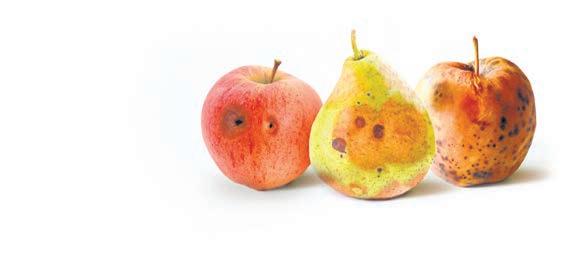
Cash Resolutions For The New Year
Maximising your pennies is easier than you think. Follow these simple tips to enhance your finances now and in the future
B Y A N d Y W EBB

Andy Webb is a money expert at the Money Advice Service. Visit money adviceservice. org.uk for details

For me, last year was all about saving. With a wedding and a honeymoon to fund, the last two years have seen my partner and I pool all our money together and drastically reduce our spending. Well, we’re now married, so the start of this year is a clean slate and a chance for me to look again at my finances for the coming 12 months. Here’s what I plan to do. These won’t all apply to you, but hopefully you’ll take some inspiration to make 2016 the year you get your finances back on track.
Keep note of what I spend
Without the wedding expenses I’ll have more disposable income each month, but I still need to make sure I don’t spend more than I have. A spending diary will not only help me keep to budget, it will also highlight places where I’m spending too much or potentially wasting money.
Look into my pension
I’ve paid into my workplace pension since I started my first job, but I’ve never looked into what that means for when I’m older. The Money Advice Service website has a pensions calculator to estimate what my current pots will be worth, and that should give me a sense of whether I need to pay in more now to have the income I think I’ll need when I retire.
MONEY
| 01•2016 106

Share the responsibility
No matter how much you trust your partner, it’s never a good idea for one person in a relationship to have total control of dealings with money.
My new wife and I will be setting up a joint account for household bills and another for savings. Then we’ll be keeping our own savings separate. Yes, much of that money will go to joint things, but it helps us both see where our salary and savings are going.
Keep on saving
Though I don’t have a big project to focus my efforts on this year, I’m still going to build up my savings pot. I always aim to have two or three months of expenses saved up
if something was to happen that meant I couldn’t work. This would cover the mortgage, bills and essential spending. But a broken boiler or unexpected car repair can make a deep dent in that.
Make a will
One of the non-romantic benefits of marriage is my wife will now automatically inherit my estate. I’m happy about this, of course, but it doesn’t mean I don’t want to leave something to other family members.
Having a will is the only way to make sure your money and property goes where you want it. If you’re not married and don’t have a will, you could also find your partner misses out completely.
01•2016 | 107
© Marek Uliasz/ a la M y s tock Photo
Should You Top Up Your State Pension?
If you’re going to reach state-pension age before April 6, you can now top up the amount of income you’ll receive from the state pension.
If you’re eligible for the scheme you can increase your state pension income by up to £25 per week, even if this takes you above the current maximum of £115.95 per week. You do this by making voluntary lumpsum contributions known as Class 3A National Insurance Contributions. You have until April 5 next year to make these.
If you’re a man born before April 6, 1951, or a woman born before April 6, 1953, you can use the scheme. You also need to be entitled to the basic state pension.
HOW MucH dOEs it cOst?
Your contribution will depend on your age—rates go down as you get older. For example, to get an extra £1 per week of State Pension, your lump sum contribution would be:
■ £890 if you’re 65;
■ £674 if you’re 75.
There’s a helpful State Pension top-up calculator at gov.uk/state-pensiontopup to help you work out the cost of your contribution.
It’s best to get advice about how this might affect other things, such as the tax you pay or benefits such as pension credits. You can talk through your options with The Pensions Advisory Service, who run a free pensions helpline. Contact TPAS on 0300 123 1047.

M oney | 01•2016 108
Hanging Up Might Not Stop Phone Scammers
Telephone fraud is where fraudsters try to dupe people into transferring money directly into criminals’ accounts, or hand over bank cards, personal information and PINs over the phone or to couriers. Scammers claim to represent a range of familiar companies and organisations, including the police, banks or utility companies.
Research from the Money Advice Service has shown three in five (63 per cent) of us have had a suspicious call in the past 12 months.
More than one in 20 UK consumers say someone has tried to gain their trust by asking them to call the phone number on the back of their debit or credit card. Known as the “no hang-up scam”, this is where the fraudster keeps the line open, spoofs a dial tone and the fraudster’s accomplice answers and impersonates whoever the victim thinks they are trying to call.
According to the Financial Ombudsman Service, many consumers lose substantial sums of money to “no hang-up” fraud.

In many cases this can amount to tens of thousands of pounds, with the Financial Ombudsman highlighting 185 complaints involving losses of up to £4.3m.
The first step is knowledge— knowing about the common scams that fraudsters are trying to use to steal your money can stop you being conned. Here are some particular tips for number scams:
■ If in doubt, hang up;
■ If you do feel the need to call back, wait at least 10 minutes before calling back on an official number;
■ Never give your personal details or transfer money to someone who has called you out of the blue.
FOR MORE, GO TO REAdERsdiGEst.cO.uK/MONEY
R EA d ER ’s d i GE st © l isa s /sh U tterstock / © Daisy Daisy/sh U tterstock 01•2016 | 109



Prevent Water Damage To Your Home This Winter




ESCAPE OF WATER is one of the most common home insurance claims, with even the smallest leak causing significant damage. With colder temperatures now here, it pays to be prepared and know what can cause leaks and water damage.
BURST PIPES
A burst pipe can be the most damaging cause of escaping water in the home, due to the amount of water that can leak at staggering speed—up to 400 litres an hour.
The most common causes of burst pipes are freezing temperatures and



corroded copper piping. Pipes and water tanks should be insulated during winter, paying close attention to joints and bends. Central heating should be kept at around 10°C during cold snaps.

LEAKY APPLIANCES
Water escaping from appliances—such as washing machines, dishwashers, radiators and boilers—are common causes of flooding in the home, so check pipework for leaks. Using your water meter, it’s easy to perform a simple leak check. First, make sure water is turned off inside and outside the home, then record the water meter
PARTNERSHIP PROMOTION







reading, then wait 15 minutes before checking again. If the meter has recorded water use during the test, it might be due to a leak.
WHAT TO DO IF YOU HAVE AN ESCAPE OF WATER
There are steps you can take before calling in professional help and your insurer. Turn the main stopcock off




immediately. Open cold taps and flush toilets to empty water from the system, switch off the central heating and don’t touch any wiring or switches you think may have been affected. If in doubt, turn off your electricity at the mains. If you are going away for more than 30 days let your broker or insurer know, so you can make sure your property remains protected.
Reader’s Digest Insurance Services provide a range of home-insurance policies from leading insurers such as Aviva, Ageas, Axa, Allianz and Legal & General. To discuss your home insurance and to obtain a competitive quotation, call us today on 020 8069 3102.
Easy-to-prepare meals and accompanying drinks
A Sort-Of Scotch Broth
BY RACHEL WALKER

Rachel is a food writer and blogs at thefoodieat.org
THIS IS ONLY A “SORT-OF” SCOTCH BROTH because it uses chicken rather than the traditional lamb or mutton, making it a cross between Highland fuel and Jewish penicillin. It’s cheap, nutritious and hugely comforting— the perfect January dish.
When imparting the secrets of a good Scotch broth, chef Simon Hopkins writes: “Any Scotch broth that looks too colourful (save for plenty of chopped parsley added at the end), too neatly and finely diced—or, heaven forbid, too thin—should be looked upon as an interloper.” The pearl barley will help thicken. Otherwise, aim for substance rather than beauty by cooking it nice and slowly to make something heartening for a cosy weekend night in.
Serves 4
• 20g butter
• 2 onions, peeled and diced
• 2 celery stalks, sliced
• 2 leeks, sliced
• 250g carrots, diced
• 250g swede, diced
• 2 bay leaves
• 4 chicken legs or thighs
• 2 litres chicken stock
• 100g pearl barley
• 100g kale
• 4tbsps fresh, flat-leaf parsley
• Salt and pepper, to taste
To serve: four bread rolls
1. Heat the butter in the bottom of a casserole pan and then add the onions, celery, leeks, carrots, swede and bay leaves.
FOOD & DRINK | 01•2016 112

Cook on a low heat for ten minutes, until the vegetables have softened.
2. Lay the chicken legs or thighs on top of the vegetables and cover with the chicken stock. Put on the lid and cook at a gentle simmer for ten minutes.
3. Add the pearl barley to the pan and bring back to a rolling simmer for 50 minutes.
TIPS…
HILL
4. Lift the chicken out of the pan and put it in a dish. Discard the skin and then use two forks to carefully shred the meat from the bone. Return the chicken meat to the pan, add the kale and simmer uncovered for two minutes. Season to taste.
5. Divide the broth between four heated dishes, making sure that you dig deep with the ladle to ensure that the pearl barley is divided equally. Top each portion with a tablespoon of fresh, flatleaf parsley and serve with a bread roll.
For an exotic, Eastern twist, stir two tablespoons of ras el hanout in with the onions and celery. Leave out the root vegetables and switch pearl barley for freekeh, a nutty Middle Eastern grain that’s cooked in the same way.
PHOTOGRAPHY
01•2016 | | 113
BY TIM & ZOË
Whisky Warmer
WITH LOTS OF LONG WINTER NIGHTS still ahead of us and Robbie Burns celebrations on the horizon (January 25), now’s the perfect time of year to crack open a bottle of whisky and enjoy a wee dram. Real whisky enthusiasts might also consider joining the growing number of whisky tourists making a pilgrimage to Scotland.
Tickets go on sale this month for the 17th annual Speyside Whisky Festival (April 28–May 2), which has a programme of 400 events, from distillery tours to tutored tastings. The festival hones in on a small but beautiful part of north-east Scotland that’s home to over 50 distilleries,

including The Glenlivet—the bestselling scotch in the world.
One of the highlights is a trip to The Whisky Shop in Dufftown where they run “bacon-butty pairings”. The festival also sheds light on lots of other hidden gems, from the Victorian Gardens round the back of Glen Grant Distillery to the Speyside Cooperage, where you can see traditional cask-making in action.
■ Visit spiritofspeyside.com for details and to book tickets
RACHEL RECOMMENDS
■ Strathisla 12-Year-Old, The Whisky Exchange, £30.75 Aged in sherry casks for a fruity dram with sultana notes, cinnamon and allspice.
■ Glenfiddich 15-Year-Old Solera, The Whisky Exchange, £37.45 A mellow whisky, rich with sweet heather honey and vanilla fudge.
■ The Glenlivet 15-Year-Old, Master of Malt, £38.69 Aged in Limousin Oak, this is a smooth dram with vanilla-apple aromas.



| 01•2016 114 FOOD & DRINK
Pudding of the Month

Cranachan
• 350g frozen raspberries
• 50g porridge oats
• 300ml double cream
• 2tbsps natural yogurt
• 2tbsps runny honey
• 2tbsps whisky
1. Tip raspberries into a bowl and leave to defrost.
2. Heat the oven to 180C. Spread out the oats on baking parchment and toast in the oven until they start to smell nutty.
3. Whip the double cream to soft peaks and then use a dessert spoon to stir in the natural yogurt, runny honey, whisky and most of the oats—leaving two tablespoons of the oats behind.
4. Take four glasses and build layers of raspberries and cream, finishing with a layer of cream. Garnish with raspberries and oats.

First Bite: How We Learned to Eat by Bee Wilson (Fourth Estate). A smart tome dedicated to common-sense eating.
BUDGET

Polar Gear Lunch
Pod, Asda, £5. Embark upon a year of healthy work lunches with this microwavable box.
BLOW-OUT

Chef’s Collection
Pegboard, Kreisdesign, £195. This sleek chef’s pegboard will keep your kitchen in order.
READER’S DIGEST 01•2016 | | 115
FOR MORE, GO TO READERSDIGEST.CO.UK/FOOD-DRINK
BOOK
© CULTURA RM/ALAMY STOCK PHOTO
BY LYNDA CLARK

Lynda Clark is a homes, property and interiors expert, and is editor of First Time Buyer magazine
Inside Outdoors
DURING THE DARK DAYS OF WINTER we spend more time wrapped up in the cosiness of our homes. But if you miss the great outdoors, why not bring nature inside? Woodland animals are beautifully illustrated on cushions and accessories. Also popular this season are ombre-effect glazed ceramics and rustic ornaments, which bring a natural edge to the scene. The landscape is reflected in shades of deep green, terracotta and teal.
Good things cushion, £8; round hedgehog cushion/ watercolour squirrel cushion, £8; stag head, £12; watercolour votive, £6; ceramic glaze lamp, £30; good things hanging sign, £4; hibernate trinket box, £10; hedgehog plate, £4; fox ornament, £10; hedgehog pot lamp, £15.
■ All available from George at Asda (asda.com/george)
Get The Look
Wildlife-inspired accessories will cheer up any home.
■ Abigail Ahern hare cushion, £40, Debenhams, debenhams.co.uk
■ Stacking mugs, £20, Ben de Lisi at Debenhams, debenhams.com
■ Woodland double duvet set, £12, George at Asda, asda.com/george



HOME & GARDEN
| 01•2016 116


GROW YOUR OWN
There’s nothing like fresh herbs to spice up a meal —and growing your own at home can be fun. This indoor gardening kit includes a little shed with removable roof, a set of herb snips, three soil pellets and seed packets for growing basil, oregano and coriander plants. It’s sure to bring a new dimension to your cookery skills.
■ From £24.99, gettingpersonal.co.uk


Start the New Year by jotting down garden notes in this genius ideas for my garden A6 notebook, £3.50, (oakroomshop.co.uk)

Collect your own seeds in these eco seedsaving tubes, set of five tubes, £6.95 (anna beljames.co.uk)

This gardener’s tin is perfect for storing seeds and bulbs, £24, (oak roomshop.co.uk)
01•2016 | 117
FOR THE GARDEN
GREAT
FOR MORE, GO TO READERSDIGEST.CO.UK/HOME-GARDEN
From trading to telly watching, these gadgets mean you’ll start the New Year with a new passion
Playing With Dinosaurs
By olly mann

Olly is a technology expert, LBC presenter and Answer Me
This! podcaster
miposaur, £99.99
When I was eight, the highlight of my Saturday mornings was Denver: The Last Dinosaur, an animated series depicting a group of tweens hanging out with a corythosaurus who played the guitar. Twenty-six years too late comes the MiPosaur, an interactive robotic dino that not only dances, but also spins, turns, sits and purrs at your command. Just like a puppy, he’ll chase a ball, come for walkies and scare the hell out of your cat. Unlike a puppy, you can lock him in the cupboard when it’s all getting a bit much.

apple app of the month: Bux, free
If you’re intrigued by the idea of trading shares but haven’t the foggiest idea how to begin, this simple app is a great introduction. First you learn to play the


market for free, divvying up your “funbux” on real companies in a safe fantasyfootball-style environment. Then, advanced users can upgrade to trade with real cash. Fear not, the app is configured so you can’t lose more than you invest.
| 01•2016 118 Technology
sky Q, price tBa
The arrival of Sky+ in 2002 was a watershed moment, bringing us Brits the chance to record and pause live TV. But in recent years we’ve been spoiled for choice; many of us “cutting the cord” to our satellite or cable service in favour of cheaper online options such as Netflix and (Sky’s own) NowTV. This 2TB box is Sky’s bid to keep us plugged in. It can simultaneously stream live, recorded or on-demand programmes on up to five TVs or tablets—all while recording four other channels in ultra HD. Time to adjust our expectations of subscription TV once again.

Varidesk pro plus 36, £350 I’ll admit it, working from home is quite laid back. But desk-bound days are dangerously sedentary—a situation hardly helped by the fact that the kitchen is mere steps away. Varidesk is one of those newfangled “standing desks” you’ve heard about; a metal workstation that rests atop your table. Just squeeze its two cantilevers and it rises up to become a standing terminal in three seconds flat. At first it made me feel like a high-powered New York executive, jogging on a treadmill while bellowing “BUY!’ ‘SELL!” into an 80s mobile phone. But, over time, it’s become second nature to vary my work position.


android app of the month: tossup, free I swear by Doodle—the smart social-planning website that calculates the most convenient date for your group of mates to meet up for dinner. Microsoft’s Tossup goes one stage further— participants vote on a restaurant, menu, dress code or anything else you’d like to outsource to the hive mind of your friends. Your enthusiasm for this will, I suspect, depend on your general approach to organisation...

01•2016 | 119
By Geor G ina yates

Georgina is a fashion and beauty editor for numerous travel titles and a blogger at withgeorgia.com
New Horizons
Fro M F il M to Fa S hion, Vita Gottlieb found her calling when she launched her eponymous womenswear label in 2012 after becoming a finalist in the Fashion Fringe contest that year. She’s presented her collection three times on the catwalk at London Fashion Week, and her expertly crafted garments have already earned her a following in the UK and further afield.
Prior to her current career in fashion, Vita worked as a freelance director and producer for various commercials, films and corporate videos. She’s also directed a number of her own short films that were aired on Channel 4. But the desire to create something more tangible was ever pressing. “Having always sketched, written and designed, it seemed like a natural development to create 3D objects from these,” says Vita. “Some part of me still misses the film industry, but in the end there were several things
Creature Comforts
■ Cath Kidston’s brushed flannel cotton pyjama set (£50; cathkidston. com) keeps you stylish while sleeping.
■ Treat your toes to a pair of Moshulu’s faux-fur-lined slippers (£35; moshulu.co.uk).

■ White Stuff’s robe provides extra warmth (£45; whitestuff.com).


| 01•2016 120
Fashion & B eauty

that encouraged me to leave, not least the 4am starts! But mainly, I just really wanted to work with my hands more.”
Vita uses gossamer-like fabrics, which are often wound around the figure in impressive sculptural forms. “It’s print, texture and textile developments that I really get excited by,” confirms Vita. “The practice of manipulating materials and sculpting them around the body entails working with my hands to create flow and restriction in equal measure.”
■ Visit vitagottlieb.com for details
BiGGer and Better
For those of us with fine flyaway hair, achieving volume is near impossible. I’ve tried it all: mousse, creams and even blow-drying upside down, but to no avail. All this changed when my new hairdresser used some magic ingredient that dramatically transformed my lacklustre mop into the triumphant bouffant I’d always desired. I begged to know his secret ingredient: aveda’s thickening hair tonic (£19; aveda.co.uk).
“Expand Every Strand” is this product’s slogan, and it doesn’t disappoint. To apply, shake the bottle well and spray the product onto damp hair, concentrating on the roots. Comb it through to the ends to aid a more even distribution. Hair will set in the way it’s dried, so lift it up from the roots with a round brush as you blow dry each section. The tonic lends the hair quite a gritty texture, giving it staying power should you wish to backcomb, curl it with tongs or wear it up.

01•2016 | | 121
Objects Of Desire
“I inherited my Grandpa’s DIY hands and have always loved using tools since I was a child,” says jewellery designer Ellie Ingram. “I never had a strong interest in fashion or even wearing jewellery growing up, but I fell in love with the making process. There’s nothing like the feeling of accomplishment after completing a design that previously only existed in your thoughts.”
Her work is certainly unique, with many of her quirky pieces consisting of charms, symbols and slogans in silver or 18c-gold plating. “My style is unserious and uncomplicated. It’s also a good reflection on how I like life to be!” Ellie affirms. “But even now it’s likely to evolve as I continue my journey through life and jewellery making.”

The style of Ellie’s jewellery— which goes by the brand name of “Bug”—means that she often works to commission. “Customers have asked for all sorts of miniature creations,” she says. “I’m very excited when I get a particularly odd request. One of my favourites so far has been a shrimp wearing a top hat and monocle!”

smoothly does it
■ Visit buggedup.com for details
With winter well and truly underway, it’s important to ensure our skin stays hydrated. the Collagen support Body Cream (£38; murad.co.uk) from Murad’s Youth Builder Body range promises to triple moisture levels for a period of 24 hours. The cream seeps easily into the skin, leaving a pleasant lemongrass and bergamot scent.

fashion & beauty | 01•2016 122 FOR MORE, GO TO readersdiGest.Co.uK/Fashion-Beauty
© Andr EW P I l SB ur Y












From psychological turns to a fictional take on an historical figure—these are the books to cosy up with this month
January Fiction
BY JAMES WALTON

James writes and presents the BBC Radio
4 literary quiz The Write Stuff
The Widow
by Fiona Barton (Bantam, £12.99)
As a former Daily Mail journalist, Fiona Barton certainly knows what she’s writing about in her highly enjoyable first novel. The widow of the title is Jean Taylor, whose recently deceased husband Glen had been the chief suspect in the disappearance of a two-year-old girl. In the classic way, Jeanie stood by him throughout the trial that ended in his controversial acquittal. But now that Glen’s dead, Kate Waters of The Daily Post signs her up for an exclusive interview, determined to discover how much Jeanine knew, suspected and/or deliberately ignored about her husband.
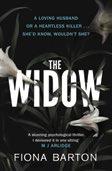
With psychological thrillers all the rage, The Widow is already being touted as one of 2016’s likely best-sellers. Even so, the book may be one for readers who particularly value the “psychological” part of the “psychological thriller” tag. In the absence of spectacular twists, the plot is gripping rather than flat-out exciting, with most of the real action to be found inside the human mind. Along the way, mind you,
NAME THE AUTHOR
(Answer on p128)
Can you guess the writer from these clues (and, of course, the fewer you need the better)?
1. He and his wife had the same name.
2. One of his characters was a teddy bear called Aloysius…
3. ...who appeared in a novel later adapted into a TV hit of the 1980s.
| 01•2016 124 BOOKS
we also learn plenty of tricks of the newspaper trade—which are often pretty hair-raising in themselves.

The Noise of Time
by Julian Barnes (Cape, £14.99)
Julian Barnes has always been willing to combine fact and fiction, and the main character of his first novel since winning the 2011 Booker Prize is the Russian composer Dmitri Shostakovich. The book provides vivid retellings of Shostakovich’s many run-ins with the Soviet authorities, after which he caved in to official pressure. Neither Barnes nor Shostakovich himself ever sees these compromises as anything other than—at the very least— unheroic. Yet, what choice did the man have? Had he been braver, he would have endangered not only his own life, but also those of his family and friends.
As the basis of a short novel, this material might sound a little obscure. In Barnes’s skilful hands, the result is both moving and often genuinely tense—as well as richly informative for those of us a bit shaky on our Soviet composers. Meanwhile, some wider themes emerge too. For one thing, aren’t we all shaped more than we like to think by the times and places we live in? And what about the difficulties we all have (let’s face it) in standing up for our principles?
PAPERBACKS
■ Trust by Mike Bullen (Sphere, £7.99). A former writer on the TV series Cold Feet who’s now provided a very funny, warmhearted and slightly melancholy portrait of middle-aged marriage.
■ Blackout by Sarah Hepola (Two Roads, £8.99). Another very funny book—despite being a candid and often shocking memoir of alcoholism. It may help keep you on the straight and narrow this January.
■ The Stranger by Harlen Coben (Orion, £7.99). Coben shows again why he’s one of the world’s best-selling writers with this stand-alone thriller that ranks with his best.
■ A Year of Marvellous Ways by Sarah Winman (Tinder, £7.99). Author of the big Richard and Judy hit When God was a Rabbit serves up another charming tale with magical trappings.
■ Jeremy Thorpe by Michael Bloch (Abacus, £10.99). Eye-popping biography of an extraordinary post-war politician.

01•2016 | | 125
KEYSTONE PICTURES USA/ALAMY STOCK
©
Publishing legend Diana Athill has led a fascinating life, as revealed in her raucous, emotive and wise memoir RD’S RECOMMENDED READ
Just Sitting And Thinking
FOR 50 YEARS, Diana Athill was a distinguished publisher’s editor, working with the likes of Jack Kerouac, Jean Rhys and Philip Roth. Yet if anything, since retiring in 1993 aged 75, she’s carved out an even more glittering career as a writer— mainly of autobiographies. (After all, she’s got quite a lot of material to work with.)
In her new book, she reflects on the memories that have proved to be her most persistent ones. She also shows that, on the eve of her 98th birthday and living in an old people’s home, her familiar qualities are firmly in place: among them her honesty, including about her often quite racy past, and her neat way with a one-liner—a Belgian she met on holiday after the war is dismissed as “good value there (he danced a mean tango), but a great bore when he turned up later in London”.
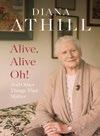
Alive, Alive Oh! And Other Things That Matter by Diana
Athill is published by Granta at £12.99
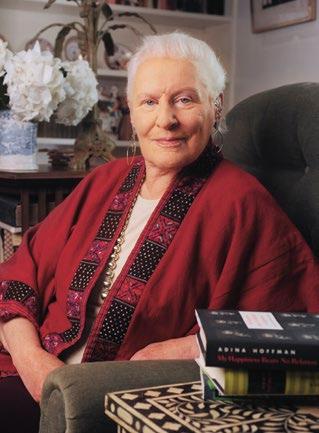
And, even in a book concerned with memories, Athill retains the ability to accept, and usually to enjoy, whatever life is offering now—at one stage celebrating the “delicious luxury” of being pushed around a packed exhibition in a wheelchair. (“The crowd falls away on either side like the Red Sea parting for the Israelites.”) One of the few moments of cantankerousness comes when she criticises people who didn’t live
| 01•2016 126 BOOKS
© MARK CRICK
through the war for describing the late 1940s and 1950s as a dreary time.
But here she is, in the introduction, explaining the main idea behind the book (not, admittedly, that she always sticks to it, because there are plenty of memories of people in the pages that follow)…
‘Sometimes I sits and thinks and sometimes I just sits.’
I have forgotten who is supposed to have said that, but it is a good description of a state quite often observed in a retirement home, and considered pitiable. Disconcertingly, I recently realised that I myself (not often, just now and then) might say those very words if someone asked me what I was doing. It is not a welcome thought, but less dreadful than it might be because I now know from experience that the state is not necessarily pitiable at all. It is even rather pleasant—or it can be. That probably depends on the nature of the person sitting. To me it has been, because the thinking turns out to be about events in the past which were enjoyable, and when my mind relaxes itself it is those same events which float in and out of it.
Until about two months ago, those events included people, usually men. I talked about it the other day with someone also in her nineties, though not so far into them as I am, and she said, ‘Yes, of course, men. What I do when I’m waiting to fall
A RARE (MILDLY) GRUMPY MOMENT FROM ALIVE, ALIVE OH!
“I can’t help regretting the passing of the evening dress— what in my mother’s young days was called a ball gown— because almost any woman moves better and looks prettier in a floor-length dress, with her shoulders emerging from beautiful material. I think its demise came about when the word ‘sexy’ became acceptable as a description of an attractive garment. It was not that young women in the past were any less eager than those of today to make men desire them, but the words we associated with desirability were ‘beauty’, ‘prettiness’, ‘charm’. I remember the first time I heard ‘sexy’ applied with approval to a piece of clothing—which would have been in the 1950s; it surprised me a bit. Because it was said by a Canadian, I thought it was probably natural as a transatlantic usage, although a bit odd—well, vulgarsounding—to English ears.”

01•2016 | 127 READER’S DIGEST
‘‘
© PICTORIAL PRESS LTD/ALAMY STOCK PHOTO
asleep is run through all the men I ever went to bed with,’ whereupon we both laughed in a ribald way, because that is exactly what I did too. It cheered me up to learn that I had not been alone in indulging in this foolishness.
But then something odd happened. The things floating out of the past
very restful. To be able to like, even to love, a man without wanting to go to bed with him turned out to be a new sort of freedom. This realisation was extraordinary. It was like coming out onto a high plateau, into clear, fresh air, far above the antlike bustle below. It was almost like becoming another sort of creature. Well, I had in fact
To be able to like, even to love, a man without wanting to go to bed with him turned out to be a new sort of freedom. The realisation was extraordinary
did often still include events which involved men, but just as often, and just as pleasurably, they were images of places and objects: all the most beautiful places and things I once experienced.
About halfway through my seventies I stopped thinking of myself as a sexual being, and after a short period of shock, found it

AND THE NAME OF THE AUTHOR IS…
Evelyn Waugh, who died 50 years ago this year. (He and his first wife were known to friends as “He-Evelyn and She-Evelyn”, and Aloysius was the teddy bear in the famous novel and 1981 TV series Brideshead Revisited.)
become another sort of creature: I had become an Old Woman! And to my surprise, I don’t regret it. In the course of the 97 years through which I have lived, I have collected many more images of beautiful places and things than I realised, and now it seems as though they are jostling to float into my mind…
When I was marvelling at the beauty of a painting or enjoying a great view, it did not occur to me that the experience, however intense, would be of value many years later. But there it has remained, tucked away in hidden bits of my mind, and now out it comes, shouldering aside even the most passionate love affairs and the most satisfying achievements, to make a very old woman’s idle days pleasant instead of boring.
| 01•2016 128 BOOKS
’’
© “EVELYNWAUGH”
BY CARL VAN VECHTEN (1880–1964)
Books
t H at CH ange D my life

Since her best-selling book The Hip and Thigh Diet in 1988, Rosemary Conley has written 37 diet and fitness books, and presented fitness DVDs with sales of over nine million. Her latest book The 3-2-1 Diet is out now.
Power for Living
In 1986, I was lying in hospital with gallstones. Things hadn’t been going well in my business or personal life, and I was feeling useless and lost. I saw an ad for this book and sent away for it. I’m so glad I did because it truly changed everything. It spoke about Christianity in a way I understood, as though it was written just for me. I proposed to my boyfriend (we’ve now been married nearly 30 years), my career took off again and I’ve never looked back.
Born to Run
By MICHAEL Morpurgo

traffic in the street, with no identification. We don’t know her past, but we’ve had her for nine years now and she’s extraordinary; I adore her. The measure of success for any film or book is how much it makes me cry. Born to Run had me in floods of tears and, like Waise, it has a very special place in my heart.
The Wisdom House
By roB pArSoNS
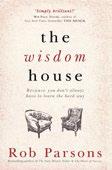

My daughter Dawn gave this wonderful book to me partly because the dog on the cover looks identical to my beloved lurcher. I found Waise (Austrian for “orphan”) running around dodging
Written like a letter to his grandchildren, this book is full of Parsons’ unique wisdom, sharing what he’s learned to be important in life. What spoke to me was the thought that, instead of pinning our happiness on things getting better in the future, we should measure our happiness from day to day. If you’ve had even one small moment that made you feel happy, you should celebrate that feeling right away and feel blessed. As told to Caroline Hutton
01•2016 | 129
FOR MORE, GO TO rEADErSDIgEST.Co.uK/BooKS
You Couldn’t Make It Up
Win £50 for your true, funny stories! Go to readersdigest. co.uk/contact-us or facebook.com/readersdigestuk
mY HUsBanD is a GolF instrUctor and he never fails to amuse me with the remarks his customers come up with.
He asked one if she knew of a way that the game of golf could be improved. She replied, “Well, I’ve always thought the holes are far too small.”
leona HeXman, Clywd

BeFore i retireD some time aGo, I worked in a lovely building overlooking the River Thames. One summer two swans built a nest right under our office next to a small pond.
We watched with interest as six eggs arrived, each laid on different days. Over the weeks we watched the swans incubate them—and were surprised when they all hatched on one day.
One of my colleagues wondered aloud how the cygnets knew when to hatch as they hadn’t all been laid at the same time. To which the office
wit replied, “I expect they used their shell phones.”
lesleY Beasant, Hampshire
WHile staYinG in a cottaGe in the Peak District, my husband found some unexpected amenities. According to the list, there was a “washing machine, dishwasher, ironing board and free wi-fe.”
emma coX, Suffolk
mY DaUGHter Was PlaYinG with her friend and they were pretending to be Disney characters. Daisy said her friend’s name was going to be
| 01•2016 130 FUn & Games
Cartoon by © Steve Jone S
Alison and I racked my brains to think of a character with that name.
“You know,” my daughter said, “Alison Wonderland.”
Genna BUrton, Clywd
a neiGHBoUr calleD to ask if we had anything she could use to post an item of jewellery to her daughter. My husband was at his computer desk in another room, so I shouted, “Do you have a small padded envelope for Pauline?”
There was a short pause before he shouted back, “Wouldn’t she fit better in a large cardboard box?”
As you can imagine, he was the only one who found it funny.
ann Bennett, Staffordshire
seVeral Years aGo, hoping to impress my in laws, I invited them to Sunday lunch—beef, Yorkshire pudding, etc. All went well until I discovered to my horror that I’d used all the flour for the pudding, leaving none to make the gravy.
In a panic, with the in-laws due in any minute, I hastily instructed my then small son to go down the lane to my friend’s house to borrow a cup of flour, while I proceeded to lay the table in a hurry.
He quickly returned with a cup full of buttercups and daisies and a beaming smile, saying, “Here are your flowers, Mummy!”
I found out later my friend hadn’t seen him—she was out—but happily
my neighbour came to the rescue with flour for the gravy.
aUDreY reDForD, Manchester
mY DaUGHter anD i were driving to the local multi-screen cinema complex and trying to decide which film to watch. As we drove past the billboard advertising each film, I mentally ran through each listing. My daughter was driving and had a quick glance before asking me, “Who’s in Leather Recliners?”
I was puzzled and she then added, “I’ve not heard of it, is it a comedy?”
In between my fits of giggles, I had to explain that she hadn’t read the whole listing, which was introducing the new luxury seating: “Leather recliners in all screens.”
melanie loDGe, Yorkshire
“WHen’s YoUr BirtHDaY, GrannY?” four-year-old Sam asked.
“October 31,” I replied. “The same day as Halloween!”
“So are you a witch?” he asked, looking interested.
I thought carefully before my answer; there must be some nice witches, after all. “Yes,” I said. “I am!”
He went out to play, looking thoughtful, and was back again after a few minutes.
“Granny, there’s a broomstick in the shed, the one grandad uses to sweep up the leaves. If I wear my bike helmet, will you take me for a ride?”
cHristaBel milner, Sussex
Reade R ’s d igest 01•2016 | 131
It’s Never Too Late To Find Your True Love!
You’re over 50 and single— now is the perfect time to get back in the dating game. But are you finding the thought of dating daunting?
Reader’s Digest dating website comes to the rescue
WHY DATE NOW?
Life begins at 50. The kids fly the nest; you have more disposable income and much more time to do all things you want to. Even though there are plenty of fun things to do alone, some things are simply better shared: holidays, walks in the country, going to the cinema, eating out, or just relaxing in front of your favourite TV show.
been badly hurt in the past or feel guilty about moving on, getting back in the dating game is easy, safe and comfortable.
GET PRO-ACTIVE
The starting point is to find someone with the same interests and habits as you.
Visit readersdigestdating.co.uk
Present yourself and your motives honestly so that if a match leads to a meeting, neither side will feel disappointed or misled.
GO ON A DATE

The most difficult aspect of dating is deciding to put yourself “out there”. Whether you’ve Browse readersdigestdating.co.uk
Accept invitations to first dates only if they are in a public place, suggested after a decent interval during which you feel confident that you have thoroughly checked out your admirer. When the date is arranged, make sure friends or family know where you are and when.
PARTNERSHIP PROMOTION
for a match today
IT PAYS TO INCREASE YOUR
Word Power
Ever wonder how words are born? If so, check out Word Histories and Mysteries, a book that probes the roots of dozens of words we toss around every day. We tossed 16 of them into this quiz. Answers—and a bit of that history— are on the next page.
1. bumpkin n—A: loudmouthed pest. B: unsophisticated person. C: poor relative.
2. kiosk n—A: vendor’s small structure. B: open-air theatre. C: Russian pastry.
3. filibuster v—A: to cut patterns into. B: add to. C: delay so as to prevent action.
4. dervish n—A: root vegetable. B: tiny African rodent. C: one who dances wildly.
5. hobnob v—A: to approach warily. B: associate familiarly. C: avoid.
6. ilk n—A: a sort or kind. B: Asian fabric. C: type of hardwood tree.
7. dirge n—A: sharp edge. B: song of grief. C: balloon-style airship.
8. pariah n—A: outcast. B: tropical fruit. C: talking bird.
9. caprice n—A: large beetle. B: garment. C: impulsive notion.
10. winsome adj—A: victorious. B: cheerful. C: thoughtful.
11. pander v—A: to cater to others’ weaknesses. B: praise. C: offer solutions.
12. hermetic adj—A. lonely, exiled. B: airtight, impervious. C: wandering.
13. lucre n—A: money. B: good fortune. C: clear in thought.
14. internecine adj—A: endless. B: mutually destructive. C: marked by collaboration.
15. zither n—A: stringed instrument. B: highest point. C: arrow holder.
01•2016 | 133
Answers
1. bumpkin—[B] unsophisticated person. (Probably from Middle Dutch bommekijn, “little barrel”, or Flemish boomken, “shrub”.) “What sort of bumpkin eats with his hands?”
2. kiosk—[A] vendor’s small structure. (From Turkish kösk, “pavilion”.) “I get my paper at the kiosk down the street.”
3. filibuster—[C] delay so as to prevent action. (From Dutch vrijbuiter, “freebooter”, via Spanish filibustero.) “Don’t try to filibuster your way out of doing your chores.”
4. dervish—[C] one who dances wildly. (From Persian darvesh, “religious mendicant”.) “She moved like a whirling dervish.”
5. hobnob—[B] to associate familiarly; drink together. (From Middle English hab or nab, “give or take”.) “It’s time to hobnob with the bosses.”
6. ilk—[A] a sort or kind. (From Old English ilca, “same”.) “I’m afraid I don’t like to read books of that ilk.”
7. dirge—[B] song of grief. (From Latin dirige, “direct”.) “The sadness of the funeral dirge haunts me.”
8. pariah—[A] outcast. (From Tamil paraiyan, “drummer” from lower class or caste.) “The group may treat a new member like a pariah.”
9. caprice—[C] impulsive notion. (From Italian capriccio, “state of fright”
in which one’s hairs stand up like those of a hedgehog.) “Jetting off to Spain is the kind of caprice he’s known for.”
10. winsome—[B] cheerful. (From Old English wynn, “joy”.) “Your winsome look tells me you’re happy to see me.”
11. pander—[A] to cater to others’ weaknesses. (Derived from Pandare in Chaucer’s Troilus and Criseyde, “gobetween in sexual intrigues, procurer”.) “Don’t pander to the voters.”
12. hermetic—[B] airtight; impervious. (From New Latin hermeticus, “pertaining to alchemy”, for Hermes, Greek god of alchemy.) “My container has a hermetic seal.”
13. lucre—[A] money. (From Latin lucrum, “monetary gain”.) “Let’s split the lucre from our lemonade stand.”
14. internecine—[B] mutually destructive. (From Latin internecinus, “murderous”.) “The clash between the various employees of that company is the worst internecine dispute I’ve ever seen.”
15. zither—[A] stringed instrument. (From Latin cithara.) “He’s a pretty good guitar player, but I’m not sure he’s ever tried his hand at the zither.”
VOCABULARY RATINGS
9 & below: Good 10–12: Excellent 13–15: Exceptional
WORD POWER | 01•2016 134
“WORD HISTORIES AND MYSTERIES” BY THE EDITORS OF THE AMERICAN HERITAGE DICTIONARIES IS PUBLISHED BY HOUGHTON MIFFLIN COMPANY, NEW YORK


We’re delighted to say our shop just keeps getting better - with a wide range of new products being added every single week.
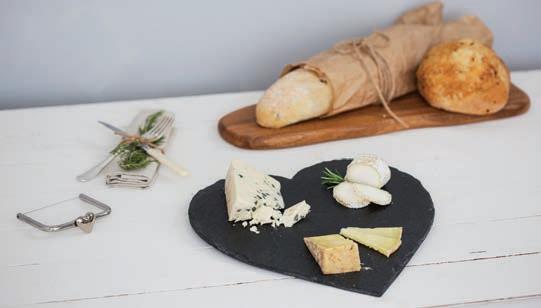



What’s more as a valued subscriber you are eligble for 10% OFF all of your purchases - simply quote RDSUB10 when ordering.
Don’t miss our JANUARY SALE which will see huge reductions on many lines, PLUS you can still claim your extra 10% off these already discounted lines.
www.shop.readersdigest.co.uk
Challenge yourself by solving these puzzles and mind stretchers, then check your answers on page 139.
BY MARCEL DANESI
CASCADE
What number belongs in the empty cell?
If the numbers surrounding this octagon make a clockwise sequence, which number is missing from the left side?
SYMBOLISM
Which symbol (^,* or •) and how many repetitions of it are missing from the last figure?
1 4 6 5 2 1 7 8 3 4 8 9 4 5 9 6 1 6 ? 3 2 4 8 7 5 4 9 ? 4 ? 19 79 159 39 639 9 | 01•2016 136 ALL AROUND THE OCTAGON
FU N & G AMES
BrainTeasers
EQUAL DISTRIBUTION
Divide this rectangle into five sections by drawing three straight lines. Draw them so that every section contains one of each of the eight different shapes.
PAIR UP
Each of these pairs of dominoes follows the same rule. Among the options given, which domino is the best fit for the fourth pair?
01•2016 | | 137
A B C D
brain teasers | 01•2016 138 CROSSwISE This month, a chance to test your general knowledge ACROSS 01 Inflate (a balloon) (4,2) 05 Draw in liquid through a straw (4) 08 Cause of a baby’s sore bottom (5,4) 09 Football official (3) 11 Puts a stop to (4) 12 Material used as floor covering (8) 14 Beaten players (6) 16 Put your trust in (4,2) 18 Colour of sailors’ uniforms (4,4) 19 White graceful bird (4) 22 Man’s best friend (3) 23 Judo expert (5,4) 24 In a lazy manner (4) 25 Uncover, reveal (6) ERSwNSA :crossA 1 low-upb 5 ucks 8 appyn ashr 9 efr 11 ndse 12 Linoleum 14 Losers 16 elyr On 18 avyn blue 19 wans 22 Dog 23 lackb belt 24 dlyi 25 xposee :ownD 2 Loped 3 Ways 4 Placid 5 chooleds 6 Carvery 7 Underlined 10 Femininity 13 Probably 15 avageds 17 Humane 20 Weeks 21 kips DOwN 02 Ran with easy strides (5) 03 Methods (4) 04 Calm, peaceful (6) 05 Trained, taught (8) 06 Restaurant where meat is sliced in front of you (7) 07 Drew attention to (words in a text) (10) 10 Womanly quality (10) 13 In all likelihood (8) 15 Badly bitten (by an animal) (7) 17 Kind, merciful (6) 20 Periods of seven days (5) 21 Jump with a rope (4) 2 3 4 5 6 7 8 9 10 11 12 15 17 14 16 13 1 18 19 20 21 22 23 24 25
* Entry is open only to residents of the UK, Channel Islands, Isle of Man and Republic of Ireland aged 18 or over. It is not open to employees of Vivat Direct Limited (t/a Reader’s Digest), its subsidiary companies and all other persons associated with the competition.
Brainteasers: Answers
CASCADE
7. The whole numbers from 1 to 9 are placed in ascending order on the diagonal starting at the top left-hand corner and ending at the bottom right-hand corner.
ALL AROUND THE OCTAGON
319. Starting at the top and moving clockwise, each number in the sequence is found by doubling the preceding number and adding 1. Or if you prefer, the difference between a number and the one that precedes it is doubled with each step in the sequence.
SYMBOLISM
^^^ or ***** or •••••••••••••••
Each ^ represents the number 5, each * represents 3 and each • represents 1. The symbols at the bottom of each figure are the sum of those at the top.
EQUAL DISTRIBUTION
PAIR UP
C. In each pair, if you add the dots in both halves of the top domino, their sum will be equal to the number of dots in the upper half of the bottom domino.
£50 PRIzE QUESTION
Answer published in the February issue
Place a number in the central box by which all the other numbers can be divided without leaving a remainder. the number is greater than 1
the first correct answer we pick on January 7 wins £50!* email excerpts@readers digest.co.uk
ANSwER TO DECEMBER’S PRIzE QUESTION
D is the missing figure
AND THE £50 GOES TO… norma Makin, aberdeenshire
R EADER ’ S D IGEST 01•2016 | | 139
426 497 355 284 142 568 ?
Laugh!
Win £50 for every reader’s joke we publish! Go to readersdigest. co.uk/contact-us or facebook.com/readersdigestuk
THEY’RE ALWAYS TELLING ME TO LIVE MY DREAMS. But I don’t want to be naked in an exam I haven’t revised for. COMEDIAN GRACE THE CHILD
BARRISTER: Doctor, before you performed the autopsy, did you check for a pulse?
Witness: No.
Barrister: Did you check for the presence of blood pressure?
Witness: No.
Barrister: Did you check for breathing at all?
Witness: No.
Barrister: So then, is it possible that the patient was alive when you began the autopsy?
Witness: No.
Barrister: But how can you be so sure, doctor?
Witness: Because his brain was sitting on my desk in a jar.
Barrister: Could the patient still have been alive nevertheless?
Witness: It’s possible that he could have been alive and practising law.
SEEN ONLINE
I WANTED MY SNAIL TO MOVE FASTER so I removed his shell. But it has the opposite effect because he seems more sluggish.
PAUL BEILBY, Lincolnshire
A LORRY DRIVER is delivering some penguins to the zoo. But his lorry breaks down in the countryside near the zoo. Luckily, a van soon comes by. The driver flags him down and hands him £300, saying, “Take these penguins to the zoo.”
A few hours later, he sees the same man heading the opposite way with the penguins still in the back. “You were supposed to take them to the zoo!” he shouts at the man,
The man replies, “I did, but we had money left over so we’re going to the cinema.” SEEN AT GOODRIDDLESNOW.COM
LITTLE MOSQUITO talks to mother mosquito. “Mum, I think people are starting to like us!”
“What makes you think that?” the mother asks curiously.
“Because every time I fly into
FUn & Games | 01•2016 140
someone’s house, I hear them clapping after me.”
WILLIAM CHEUNG, Middlesex
A BLONDE, BRUNETTE AND A RED HEAD are waiting in front of the pearly gates when God comes out to greet them.
“Usually I wouldn’t let any of you ladies in, but I’m having a good day. I’ll give you all a deal. If you can climb my 1,000-step staircase and listen to a joke at each step without laughing, I’ll let you in.”
They all agree. The brunette loses at the 100th step. The red head loses at the 500th step. The blonde makes it to the 999th step and begins to laugh hysterically. God asks her, “You were so close, why did you laugh?”
She replies, “I just got the first one.”
SEEN ONLINE
I ASk PEOPLE why they have deer heads on their walls. They always say because it’s such a beautiful animal. There you go. I think my mother is attractive, but I have photos of her.
COMEDIAN ELLEN DEGENERES
WHAT HAS A BOTTOM at its top? A leg. SEEN AT GREATCLEANJOkES.COM
MY MATE AND I WERE IN A PUB debating where the barman originates from. I said he was an Eskimo. He said Native American. Turns out he was an Eskimo. Inuit all along.
COMEDIAN RICHARD GADD
INSTANT AHHHH!
Sometimes, all you need is a picture of a cat and a dog getting along (as seen on the internet)




Reade R ’s d igest 01•2016 | 141
A MAN MEETS A GORGEOUS WOMAN
in a bar. They talk, they connect and they end up leaving together at the end of the night.
They get back to her place and, as she shows him around, he notices that her bedroom is packed with teddy bears. Hundreds of small bears are on a shelf all the way along the floor, medium-sized ones are on a shelf a bit higher and huge bears are on the top shelf along the wall.
The man is surprised by this, but he decides not to mention it to her. She turns to him, they kiss and things heat up. After an intense night of passion—as they are lying there together in the afterglow—the man rolls over and asks, smiling, “Well, how did I do?”
The woman looks at him and says,
“You can have any prize from the bottom shelf.” LEE HALL, Kent
FROM TIME TO TIME, two elderly couples get together to socialise and keep their minds stimulated. One day, one of the men, named Harry, starts talking about a fantastic restaurant he went to the other night with his wife.
“Really?”, says his friend George, “What’s it called?”
After thinking for a few seconds Harry says, “What are those nicesmelling flowers called again?”
George thinks for a moment.
“Do you mean rose?” he asks.
“Yes that’s it!” Harry exclaims. Looking over at his wife, he says, “Rose, what’s that restaurant we went to the other night?” SEEN ONLINE
BITE-SIzE PERSPECTIVE
Think you’re having a bad day? #FirstWorldProblems highlights those peccadilloes that, although minor, tend to spoil an otherwise peachy existence (as seen on Twitter):
I had such a long, hot shower that my fingerprint was too wrinkled to unlock my iPhone.
I should know how to get home, but my house is so new that my car’s GPS can’t find it.
Facebook keeps changing my news feed to “Top Stories” when I want it to be on “Most Recent”.
My insulated coffee mug keeps my coffee hot for too long—I just want to drink it.
Laugh | 01•2016 142
Beat the Cartoonist!

Think of a witty caption for this cartoon—the three best suggestions, along with the cartoonist’s original, will be posted on our website in midJanuary. If your entry gets the most votes, you’ll win £100 and a framed copy of the cartoon, with your caption.
Submit your captions online at readersdigest. co.uk/caption by January 15. We’ll announce the winner in our March issue.
November’s Winner
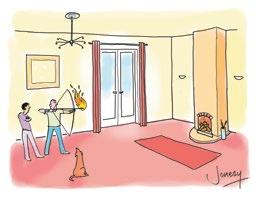
It’s a new year, but it’s the same result. Reader Nina Straughan easily pocketed victory with her caption, “I’m sick and tired of you and your flaming archery”, leaving cartoonist Steve Jones’ original “Why can’t you use a match like everyone else?” in the dust. It looks like more pain for the pros in 2016.
SCOREBOARD: readers 36 Cartoonists 12
in the february issue

“Put That Light Out!”
Toby Jones and Michael Gambon (aka Mainwaring and Godfrey) open up about the new Dad’s Army film.
Plus
• finding Love Later in Life
• “i remember”: robson Green
• Why it’s healthy to forgive
• best of british: Chocolatiers
Reade R ’s d igest 01•2016 | 143
h
NS BY © S T eve Jo N e S
Bo T
Ca RT oo
60 Second Stand-Up
We caught up with wry comic
WHAT’S YOUR FAVOURITE OF YOUR OWN JOkES?
If you have bingo wings like I do, just wait until you’re in a car travelling over 50 miles an hour. Stick your arm out the window. You’ll laugh for five minutes—then you’ll cry for a year.
HAVE YOU FOUND ANY PARTS OF THE COUNTRY TO BE FUNNIER THAN OTHERS?
Anywhere that’s a city with a strong identity. Then you can go somewhere like Nantwich and they hate you.

WHAT’S YOUR MOST MEMORABLE HECkLE EXPERIENCE?
Someone left me Ferrero Rocher on stage with a note asking me out. I didn’t go out with them—I ate the Ferrero Rocher though.
ANY FUNNY TALES ABOUT A TIME YOU BOMBED ON STAGE?
I once had an awful gig where I didn’t even say hello when I walked on stage. It was in Nantwich.
WHAT’S YOUR FAVOURITE ONE-LINER?
A Simon Munnery one: “Socrates said the unexamined life isn’t worth living. I always think, How does he know?”
WHO’S YOUR COMEDY INSPIRATION?
My mum. We’re very different.
IF YOU WERE A FLY ON A WALL, WHOSE WALL WOULD YOU BE ON?
A Hollywood producer. I reckon you’d see some stuff.
IF YOU COULD HAVE A SUPER POWER, WHAT WOULD IT BE?
I already do. I consider myself to be Sarcasm Girl. I’d turn up at the scene of a crime and do a slow hand clap.
Tiff Stevenson is touring nationwide this year. Visit tiffstevenson.co.uk for details.
Laugh | 01•2016 144
FOR MORE, GO TO READERSDIGEST.CO.Uk/FUN-GAMES




Britain’s Bestselling Personal Diary 2016



Product Code: P11802
A beautiful hardcover diary packed with mouth-watering weekly recipes, hints & tips and much more…


■ Address and notes section
■ Useful household ‘how-to’ guides
■ Weekly recipes

■ Home budgeting tracker
■ Metric conversions

HOW TO ORDER
(Please quote RDP036 when ordering)


■ Travel and household guides

Phone: 0844 332 8080 (8am-8pm Mon-Fri, 9am-5pm Sat-Sun)


Online: shop.readersdigest.co.uk

* plus £1.99 postage and packing per order



By Post: Reader’s Digest, FREEPOST , RTHR-LLRY-ZHYS, Ringwood, BH24 1HD (Cheques should be payable to Reader’s Digest, and please remember to quote RDP036 and include your full name and address, along with the details of the item(s) required).

ONLY £7.99* ONLY £9.99*
Product Code: P11803
SHOP


















































































 tom Browne
tom Browne






































 PHOTO BY SARAH QUANTOCK
PHOTO BY SARAH QUANTOCK


































 Michael Caine and Harvey Keitel getting back to nature in Youth
Michael Caine and Harvey Keitel getting back to nature in Youth









































































































 ■ Fiona Gibson’s The Woman Who Upped & Left is released in digital format and paperback next month.
■ Fiona Gibson’s The Woman Who Upped & Left is released in digital format and paperback next month.
























 Goalie Tudorel Mihailescu directs his team at a match on their home ground
Goalie Tudorel Mihailescu directs his team at a match on their home ground

















































 Xu Peng, 19, the superstar student who made it into the elite Tsinghua University
Xu Peng, 19, the superstar student who made it into the elite Tsinghua University































































































































































































